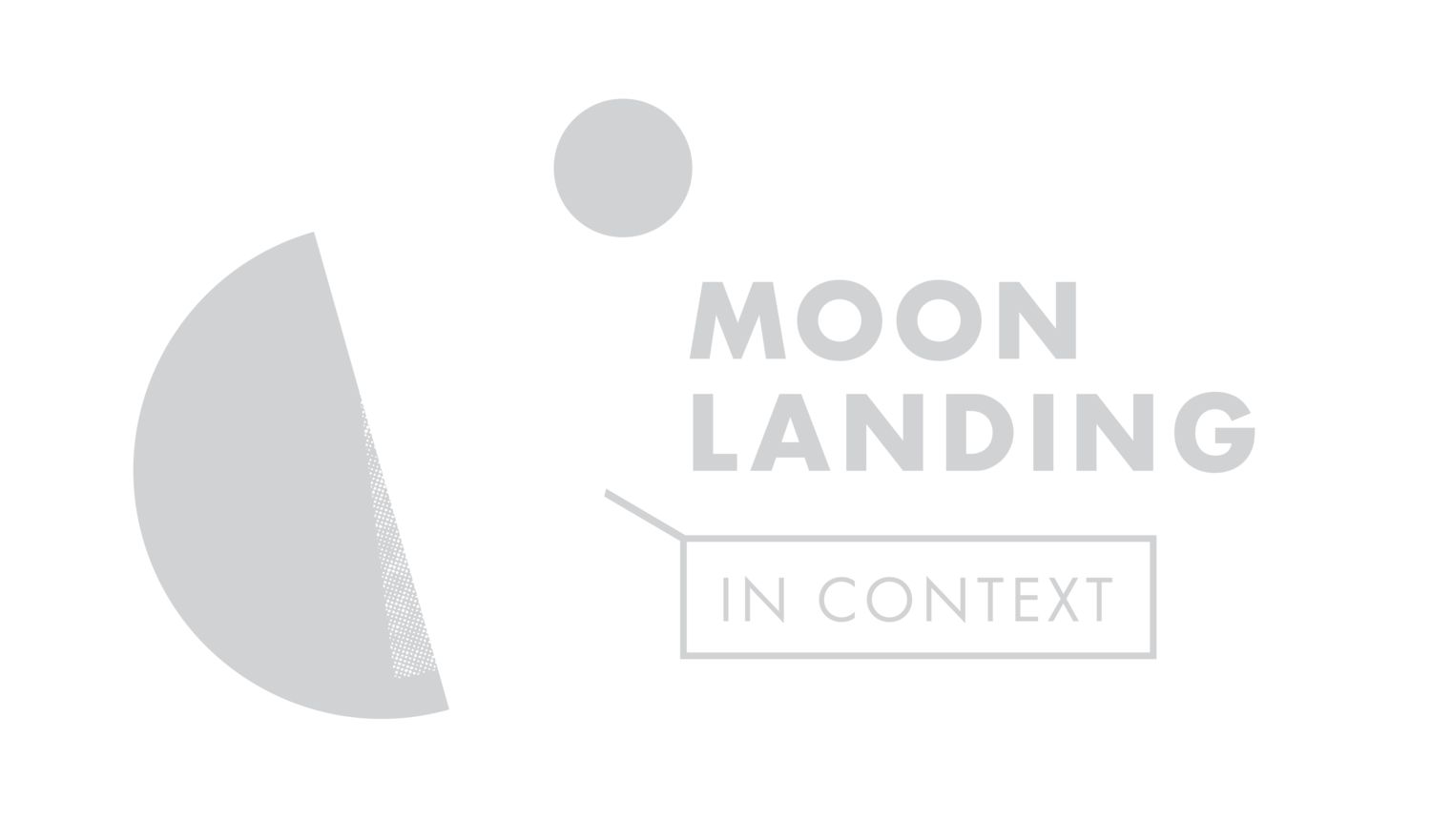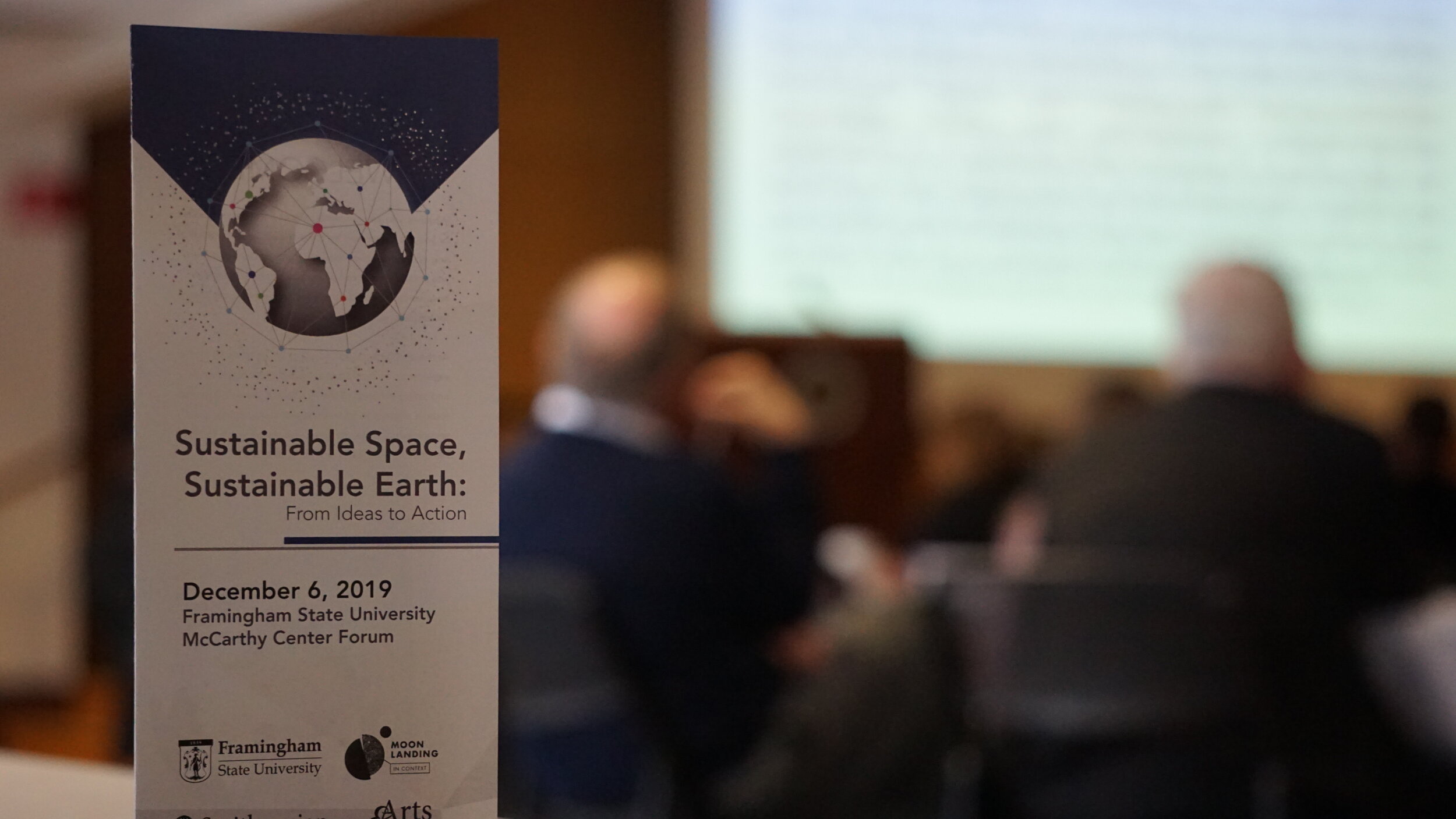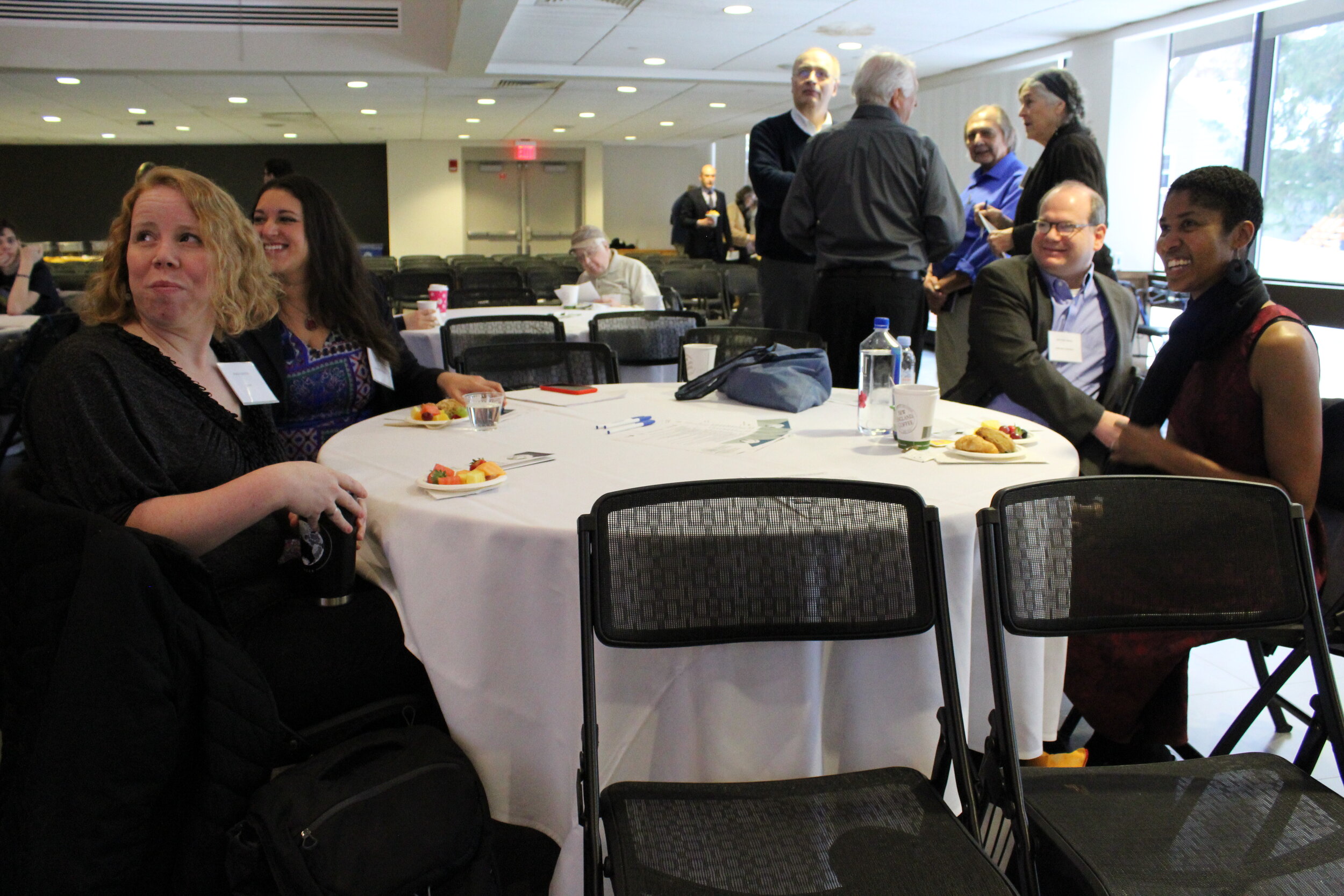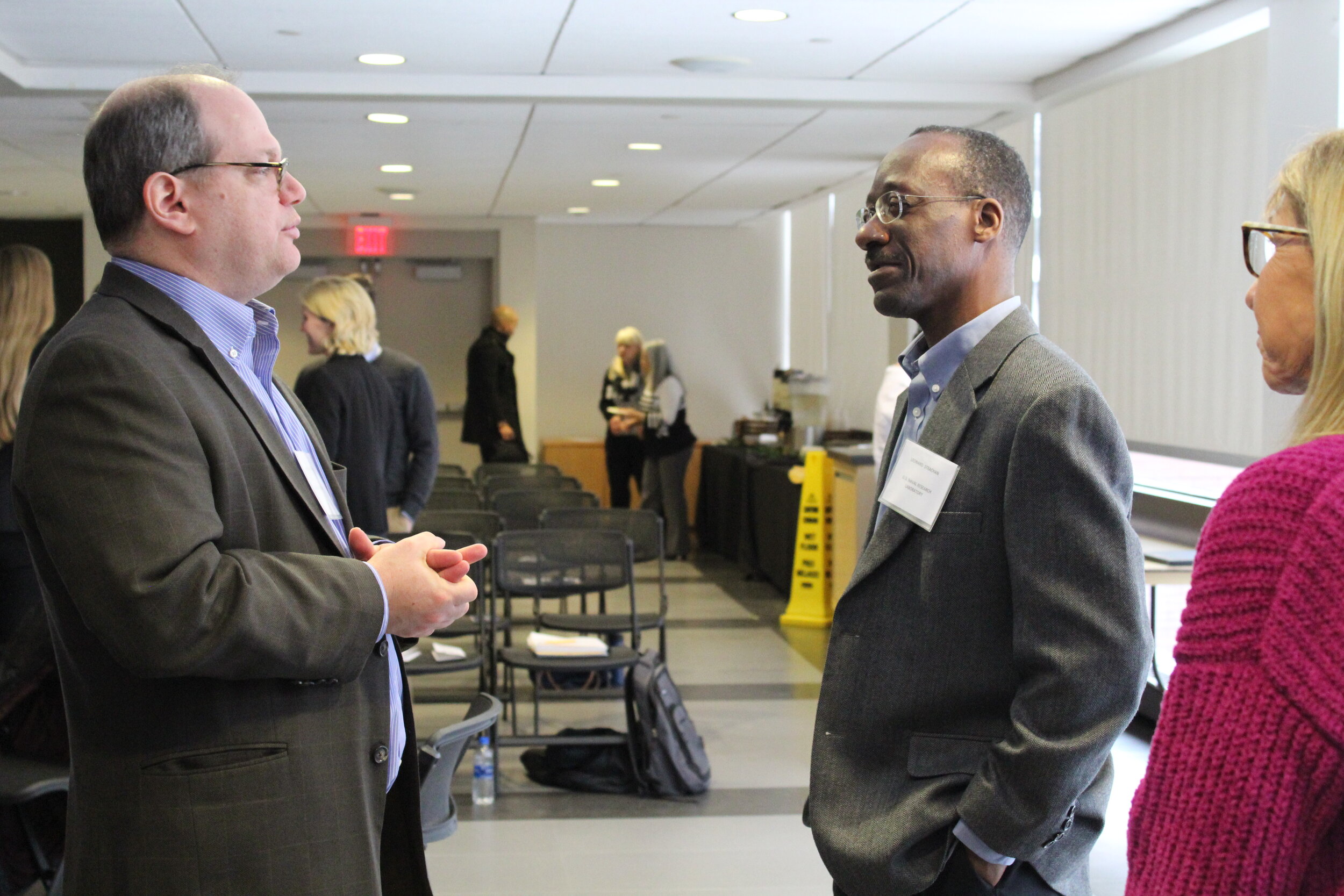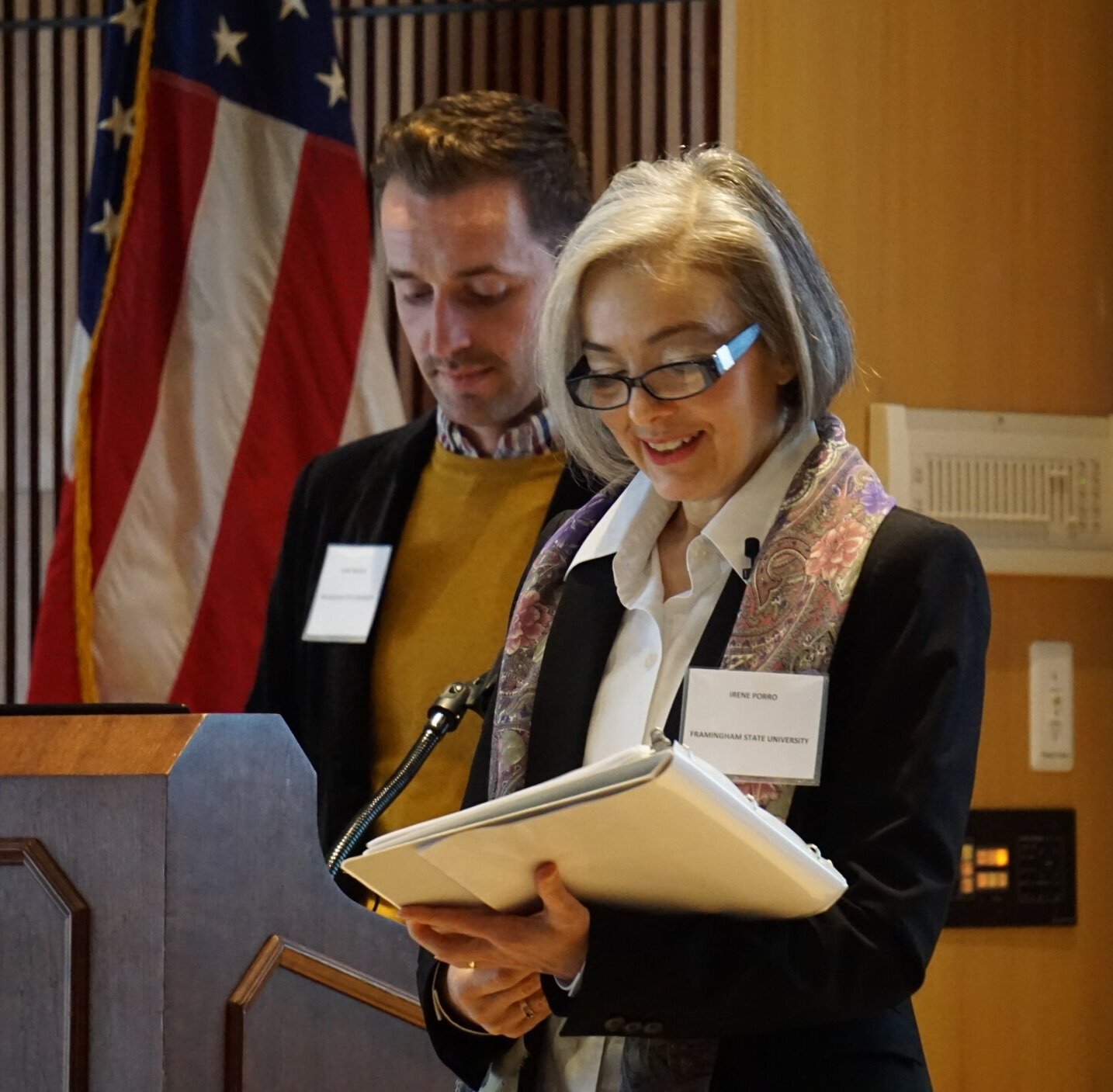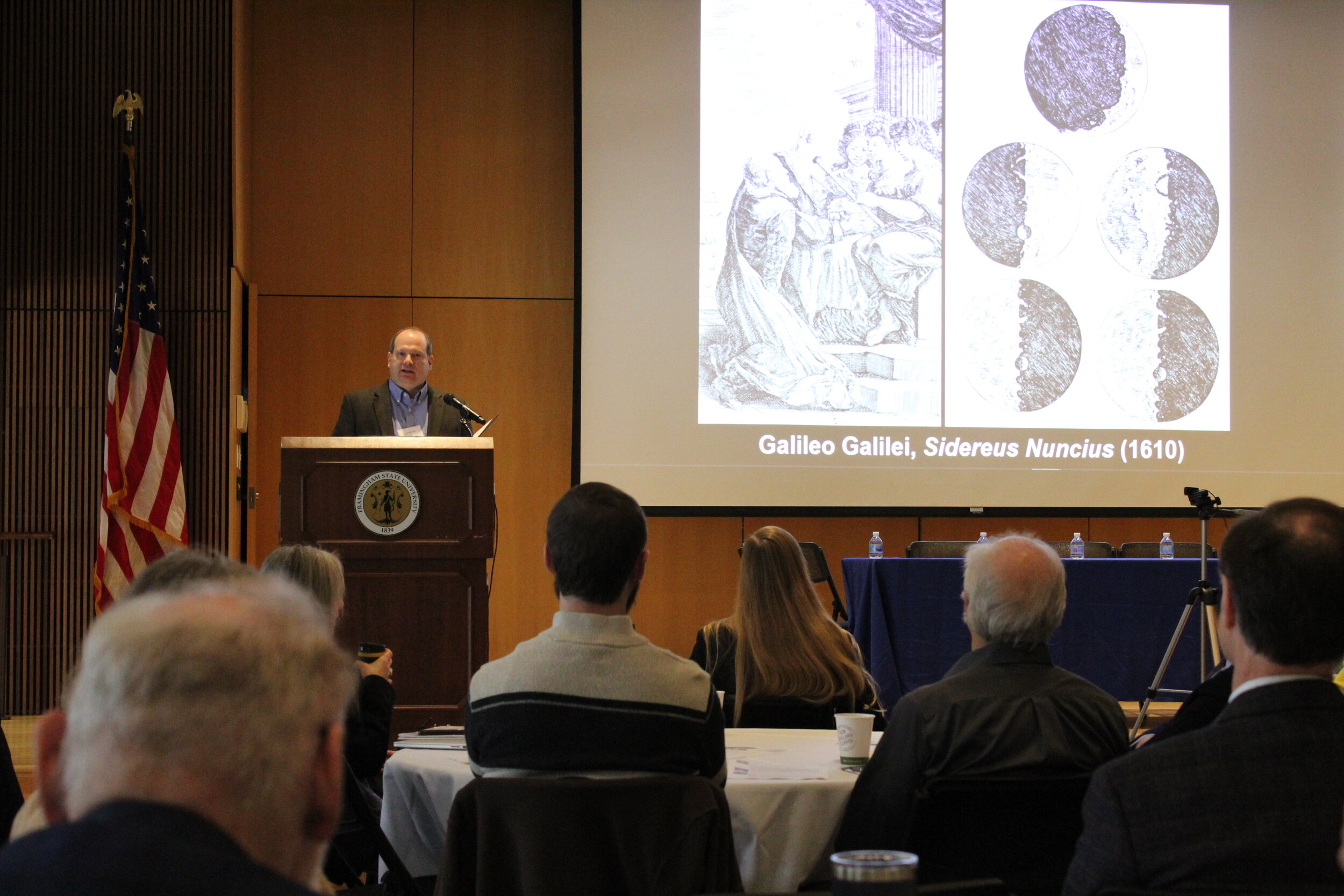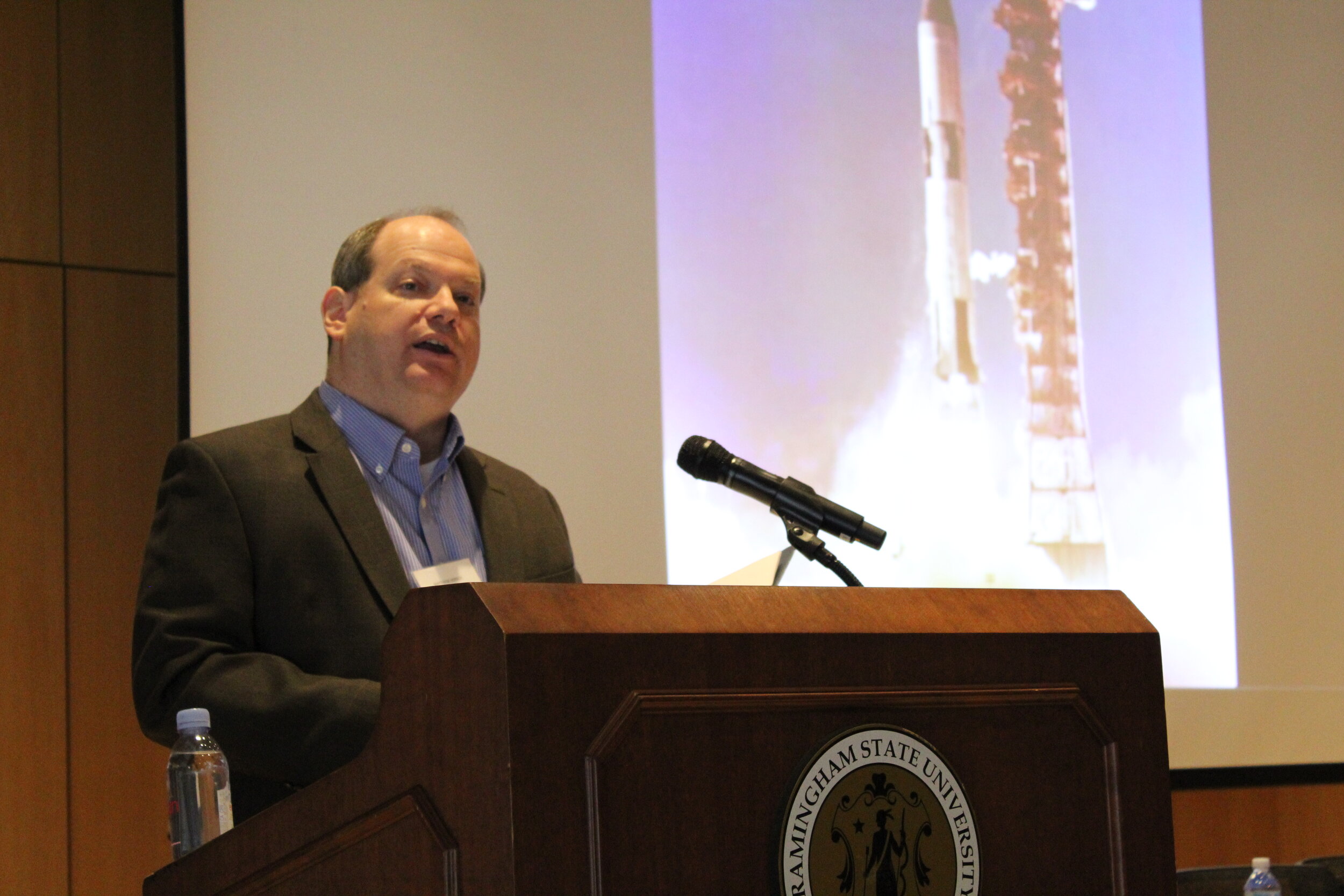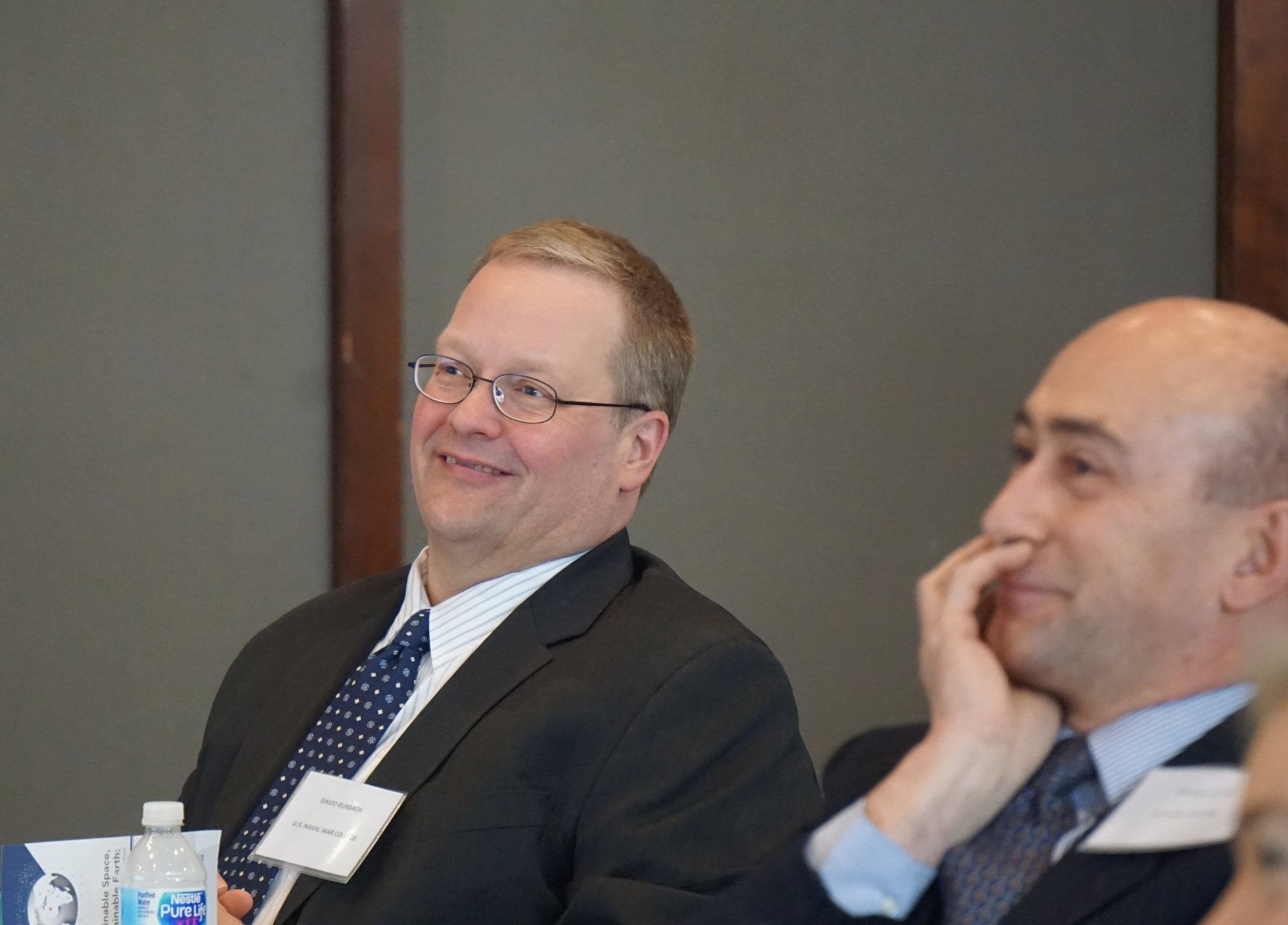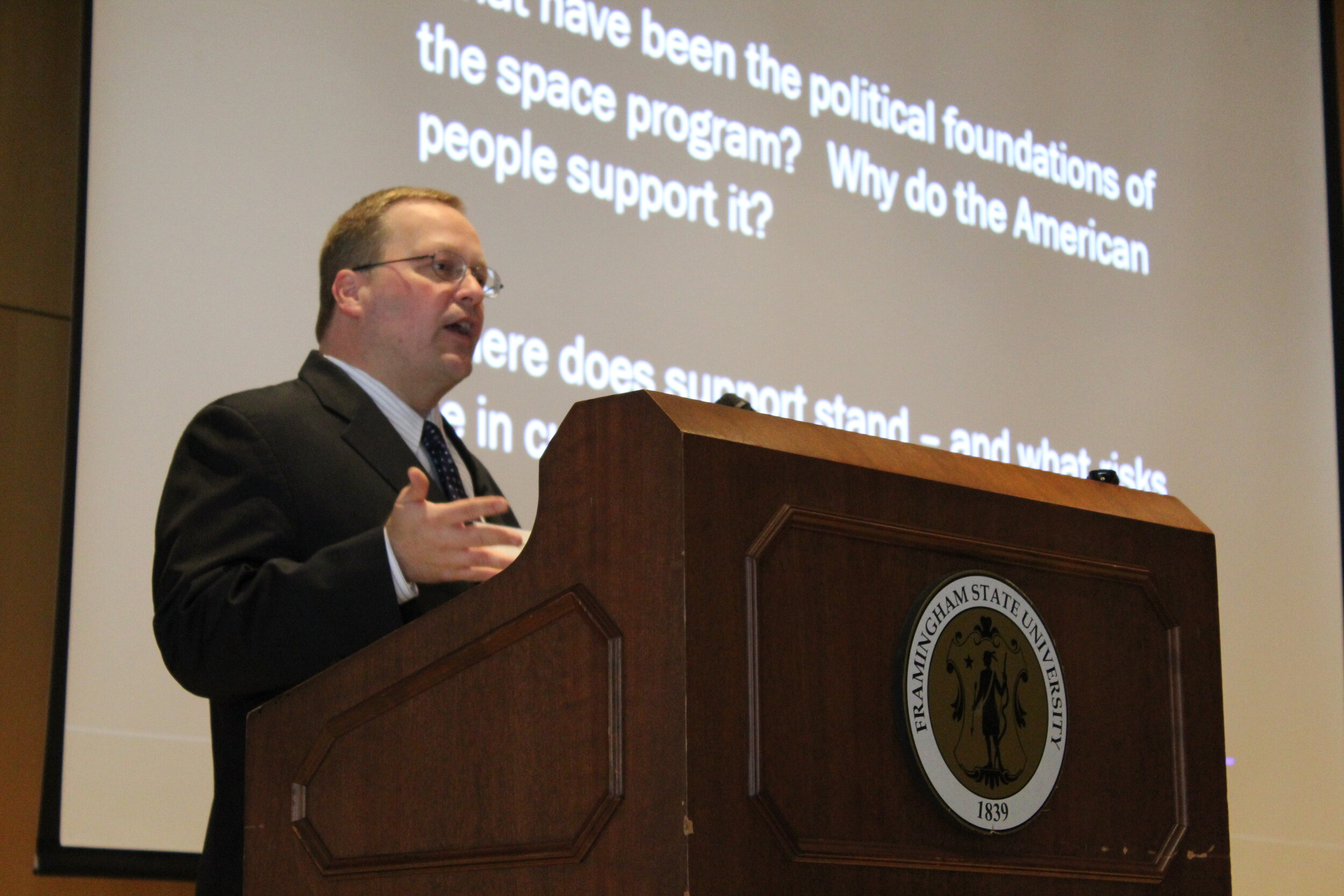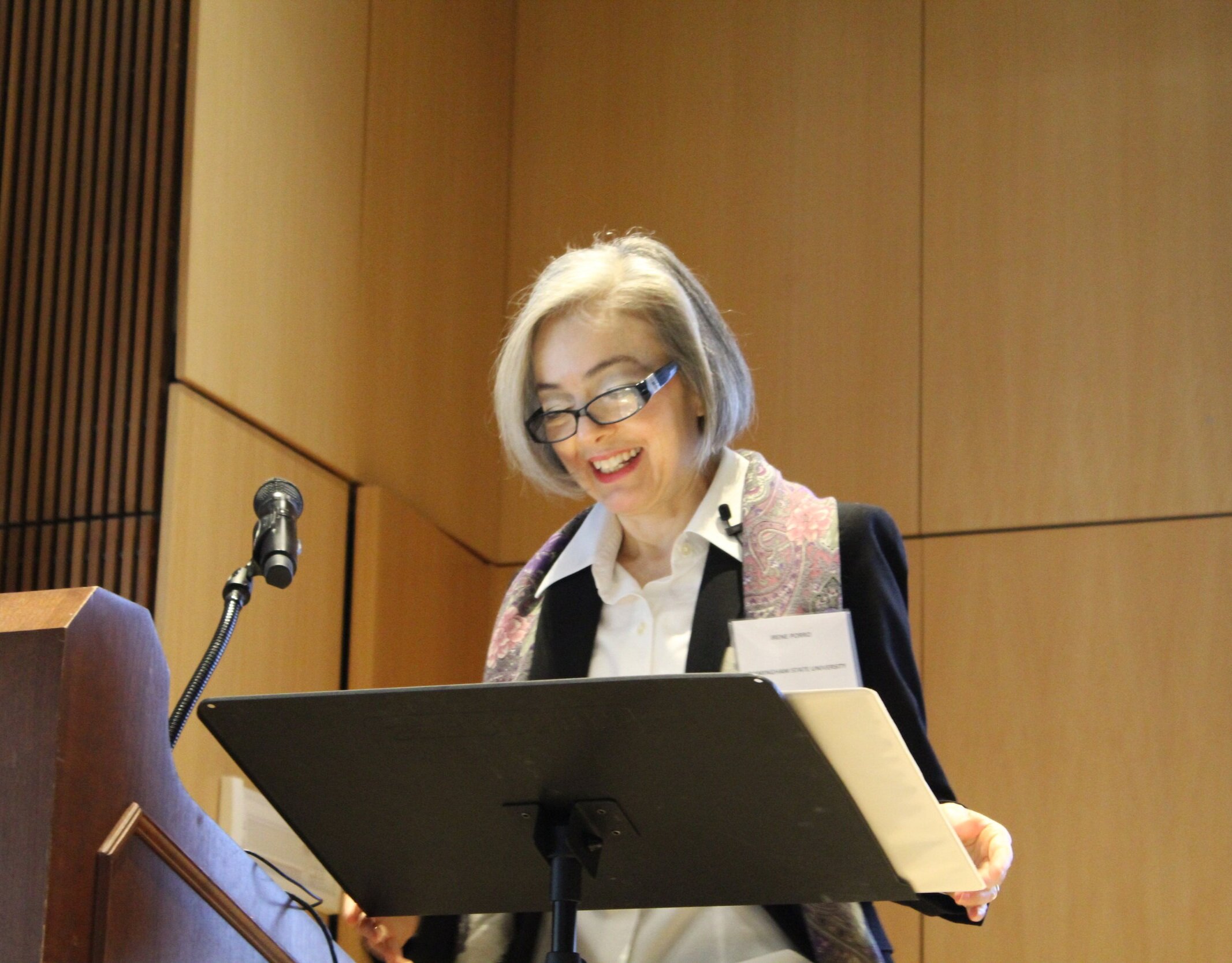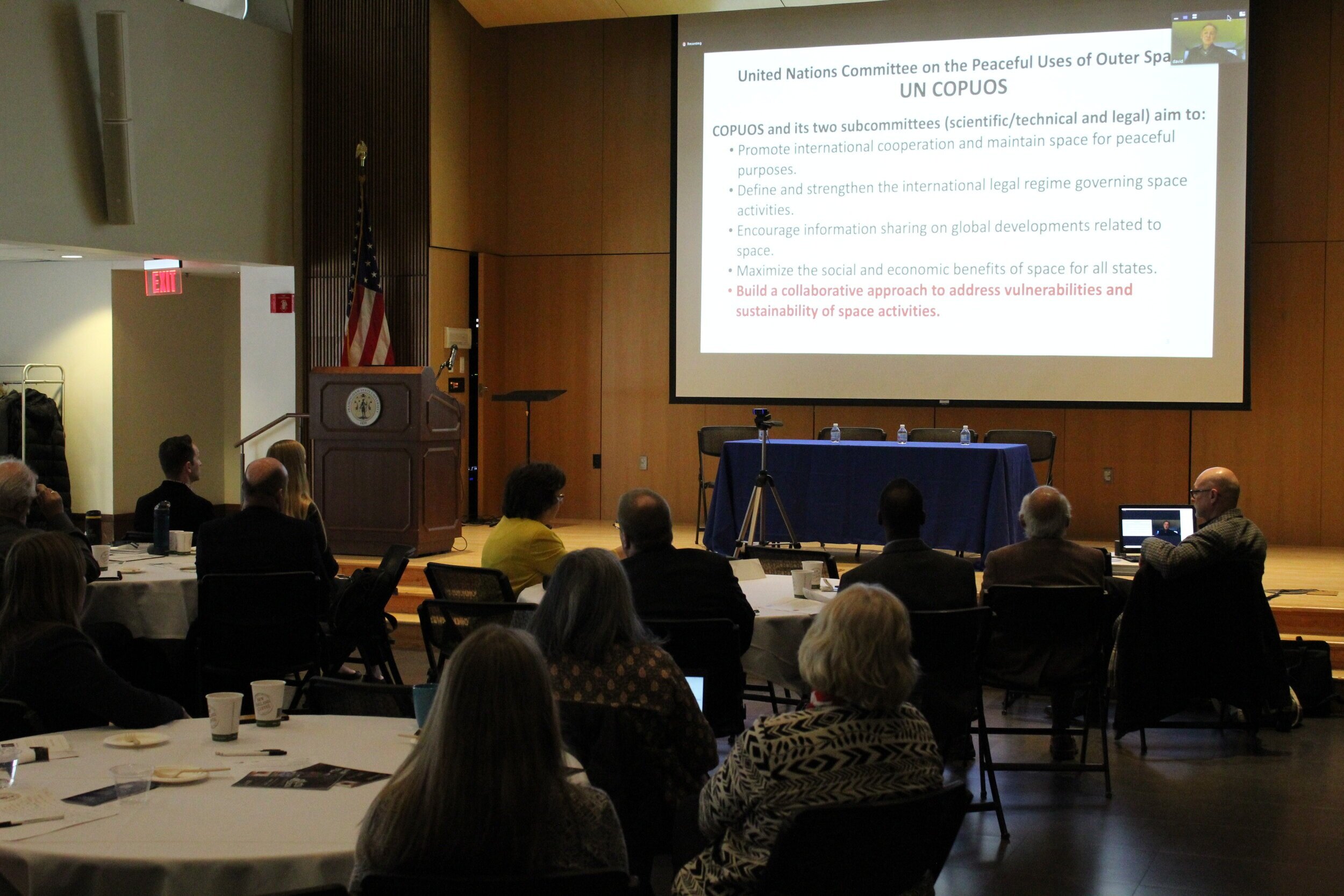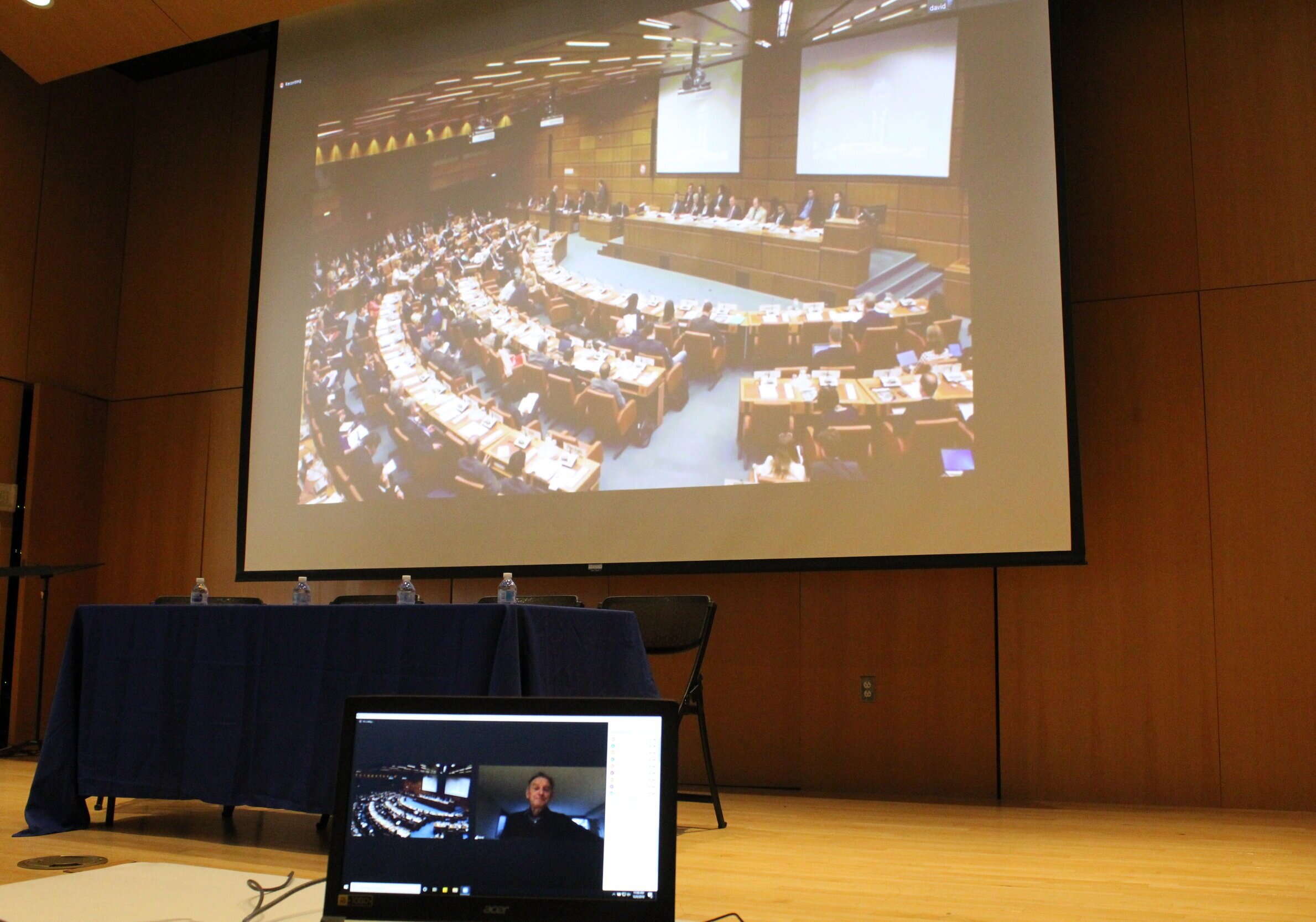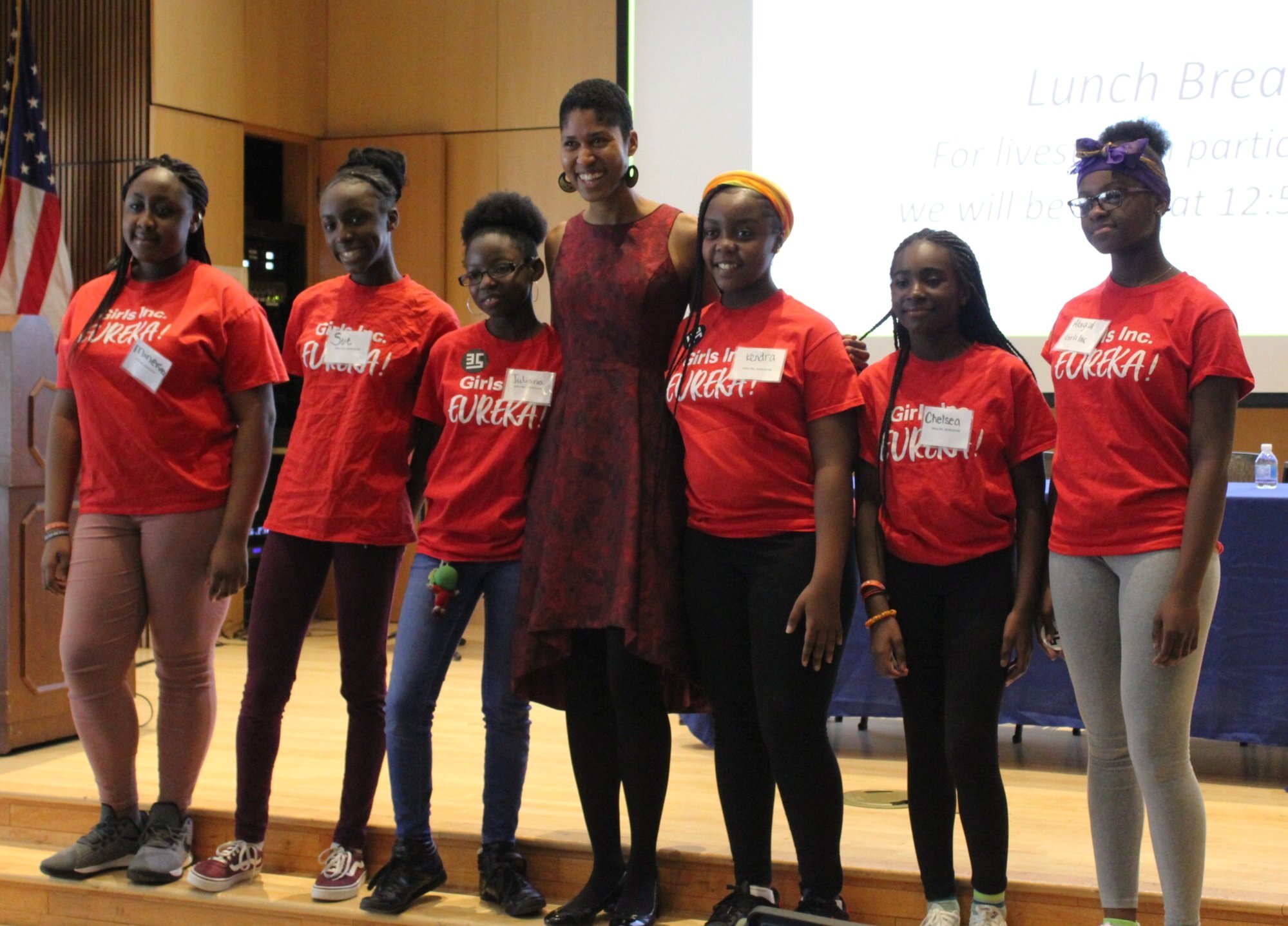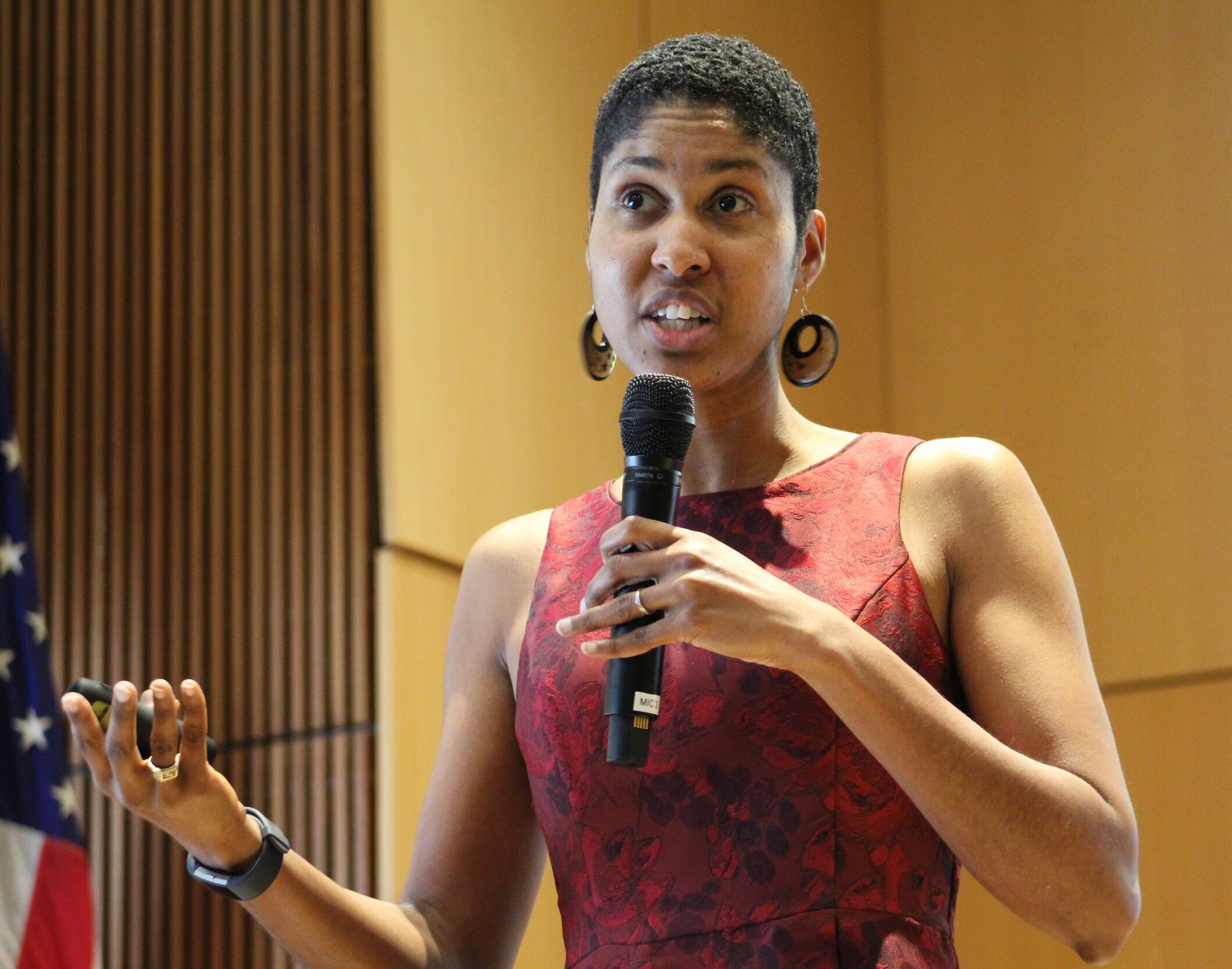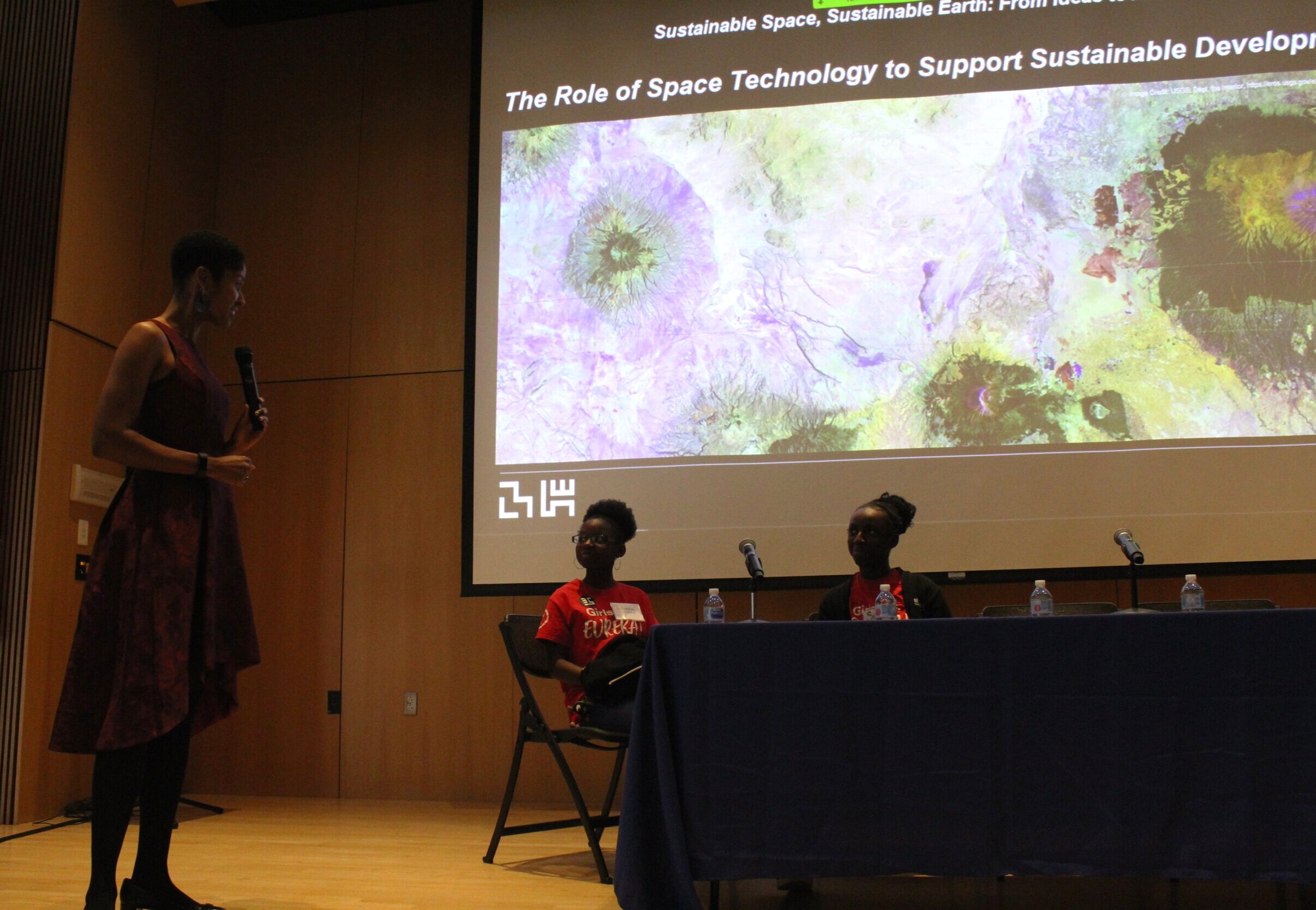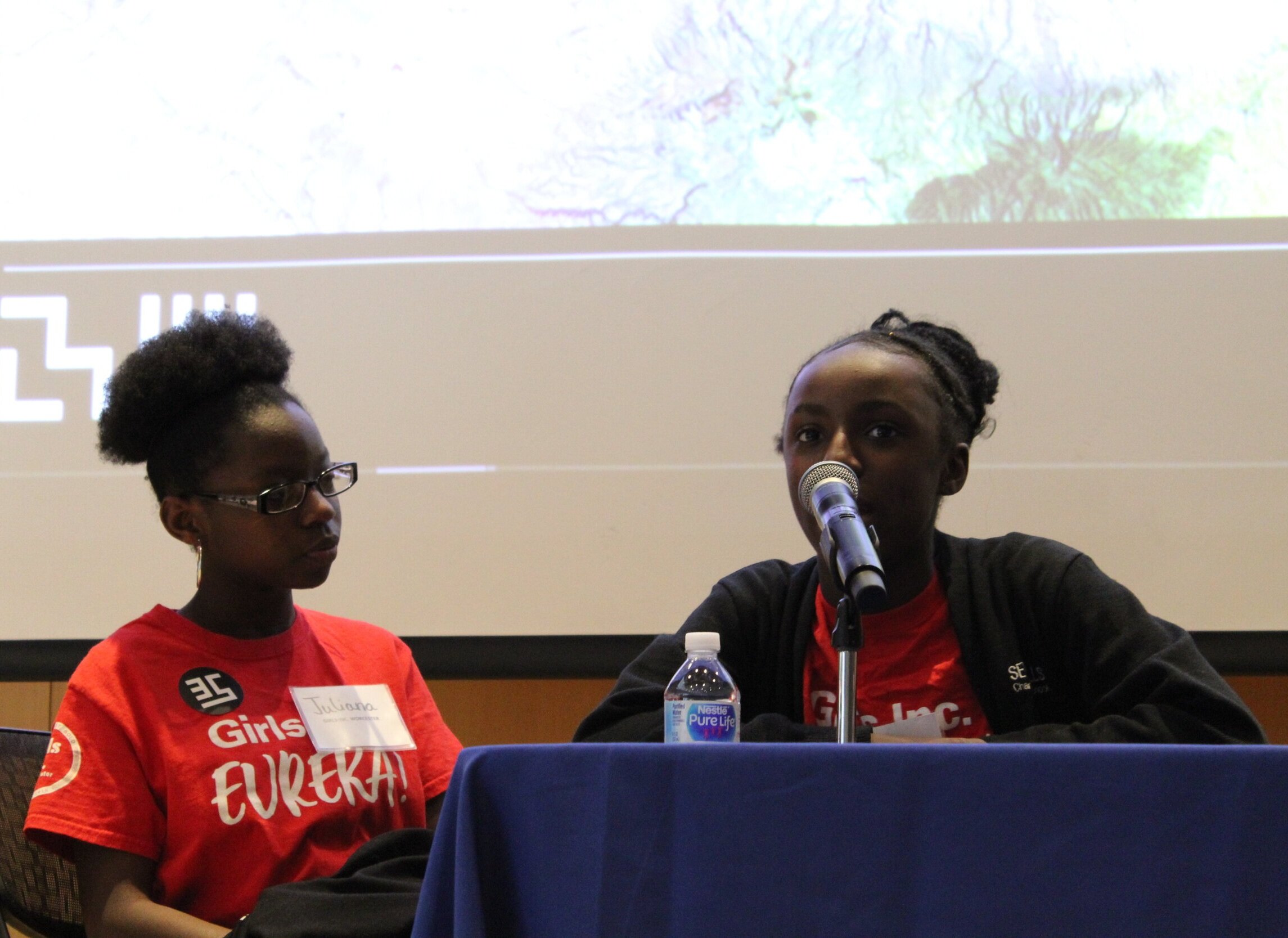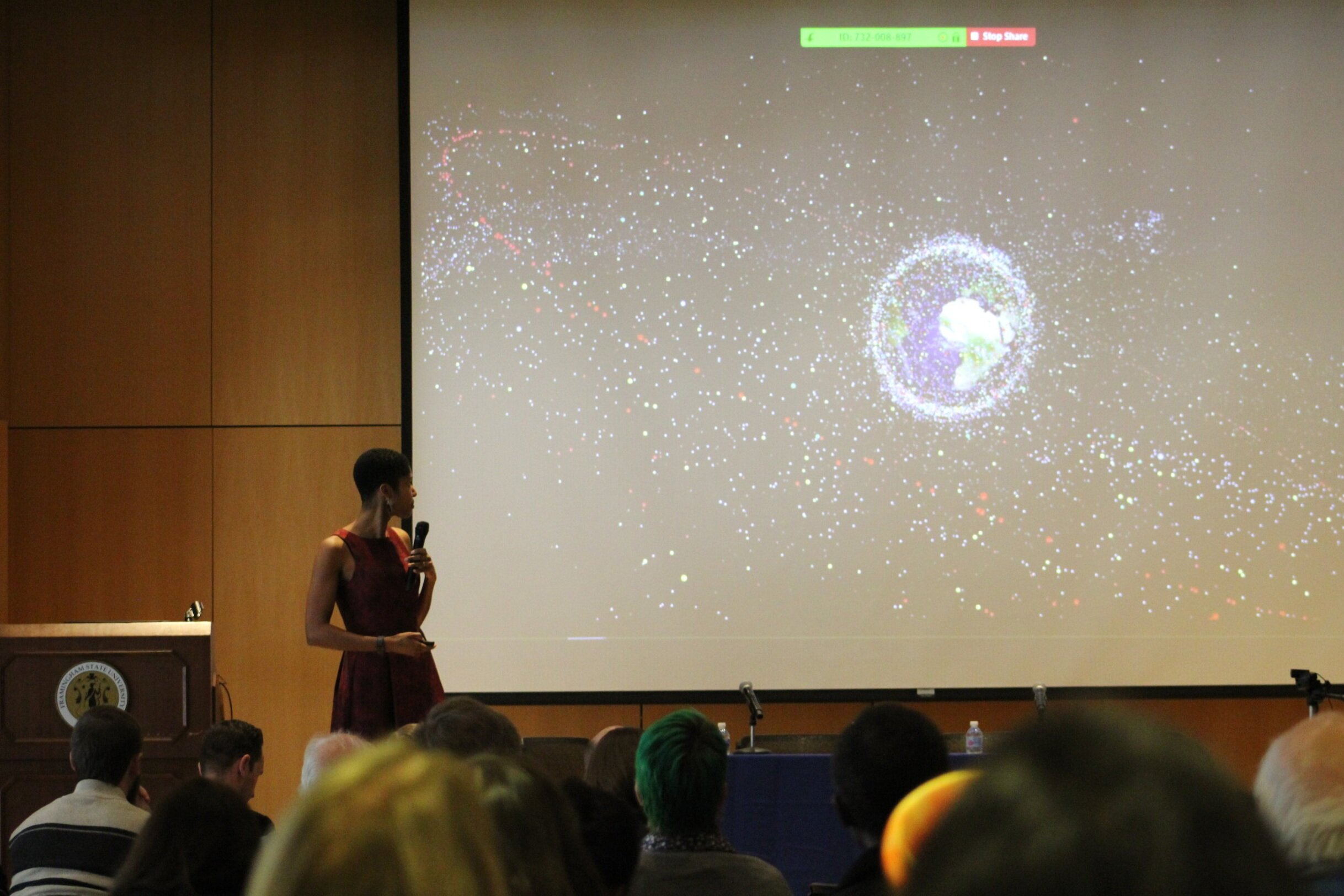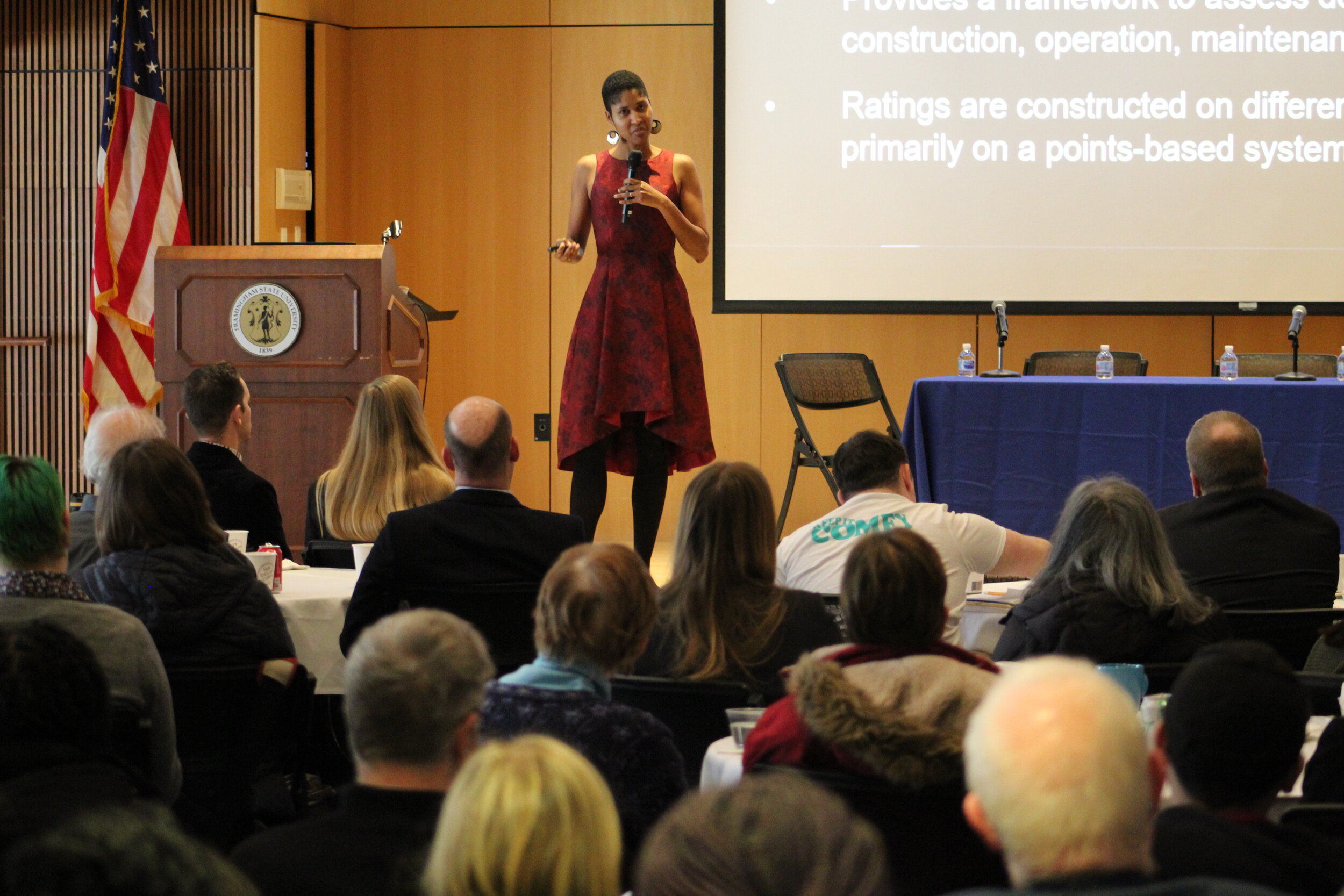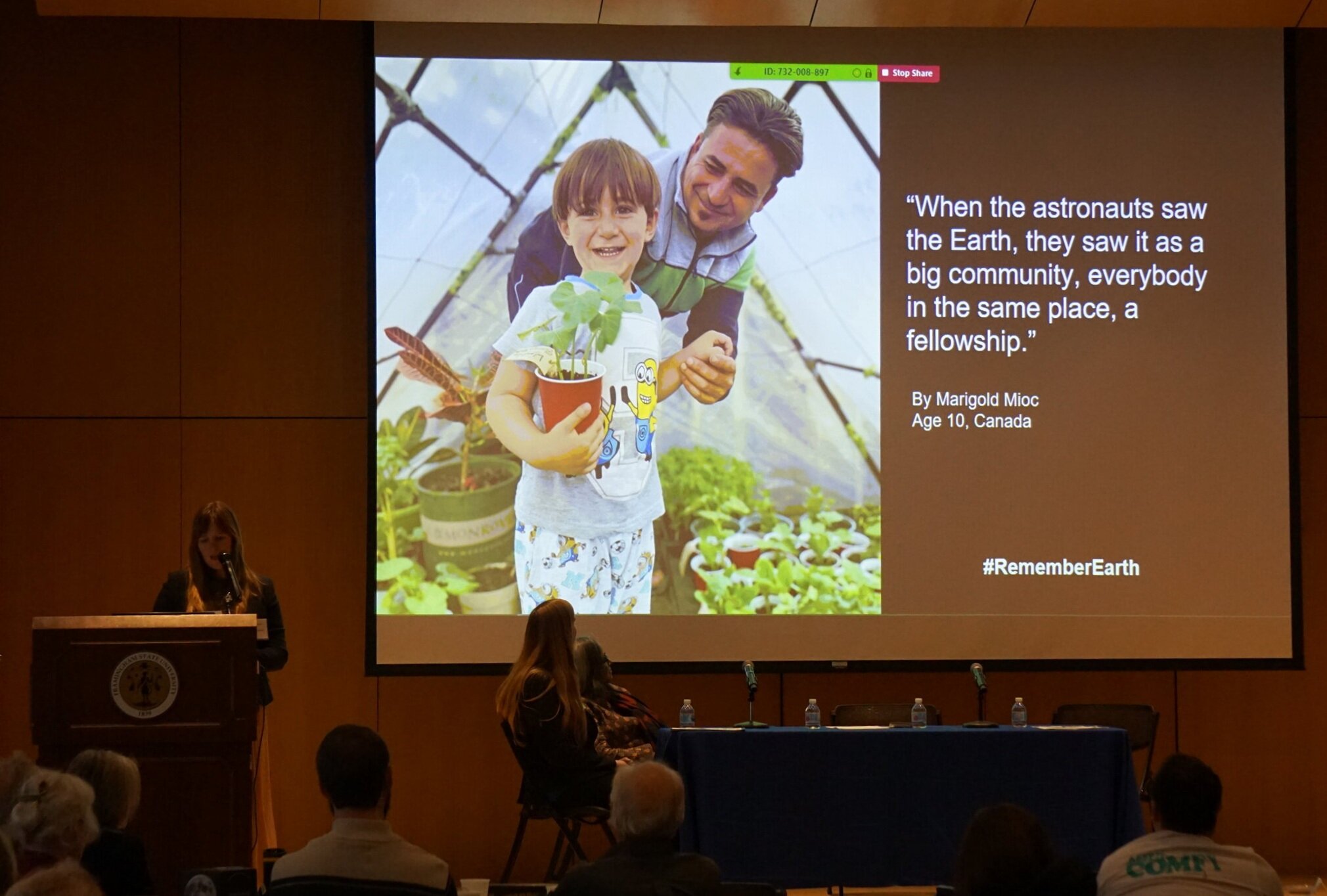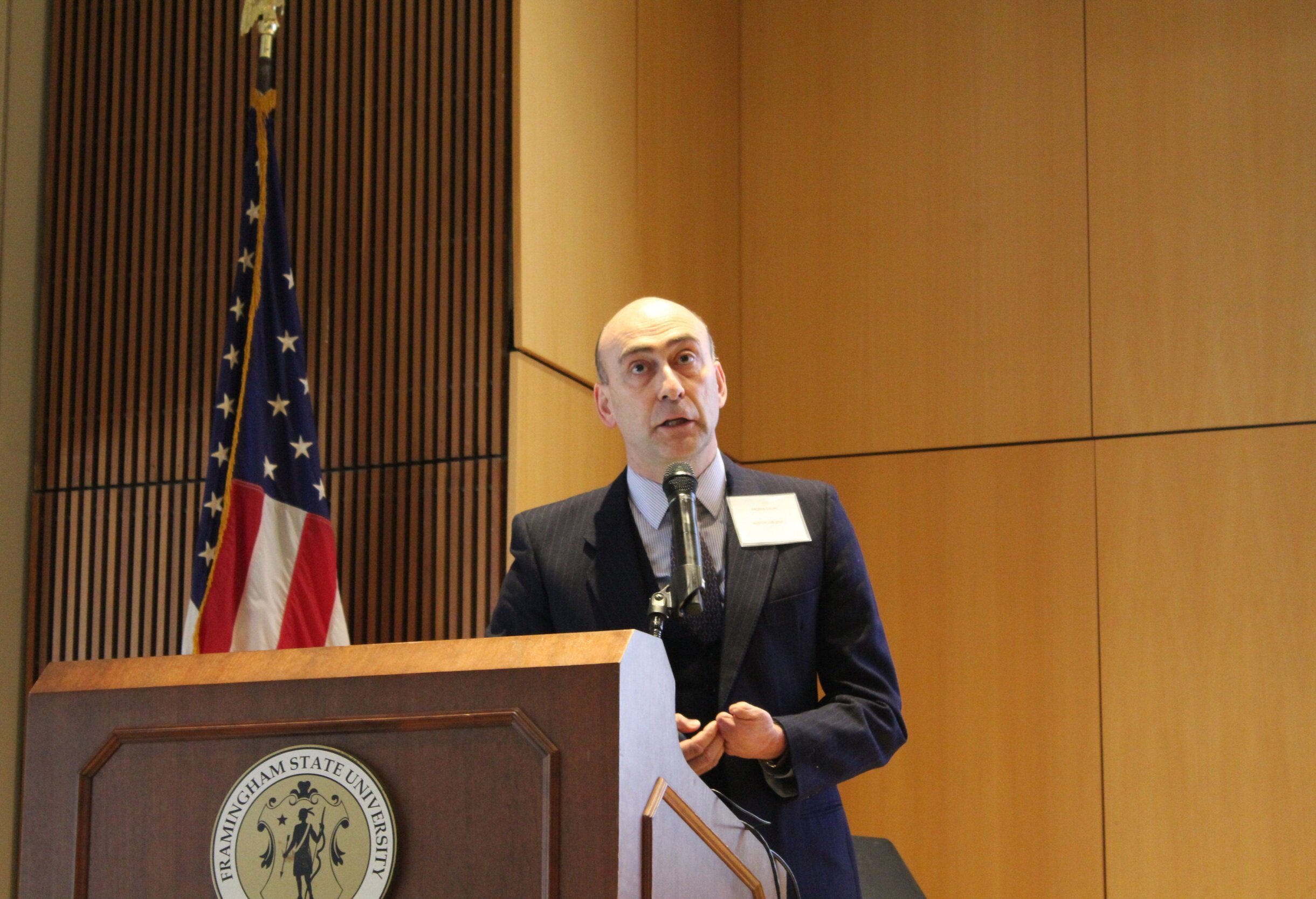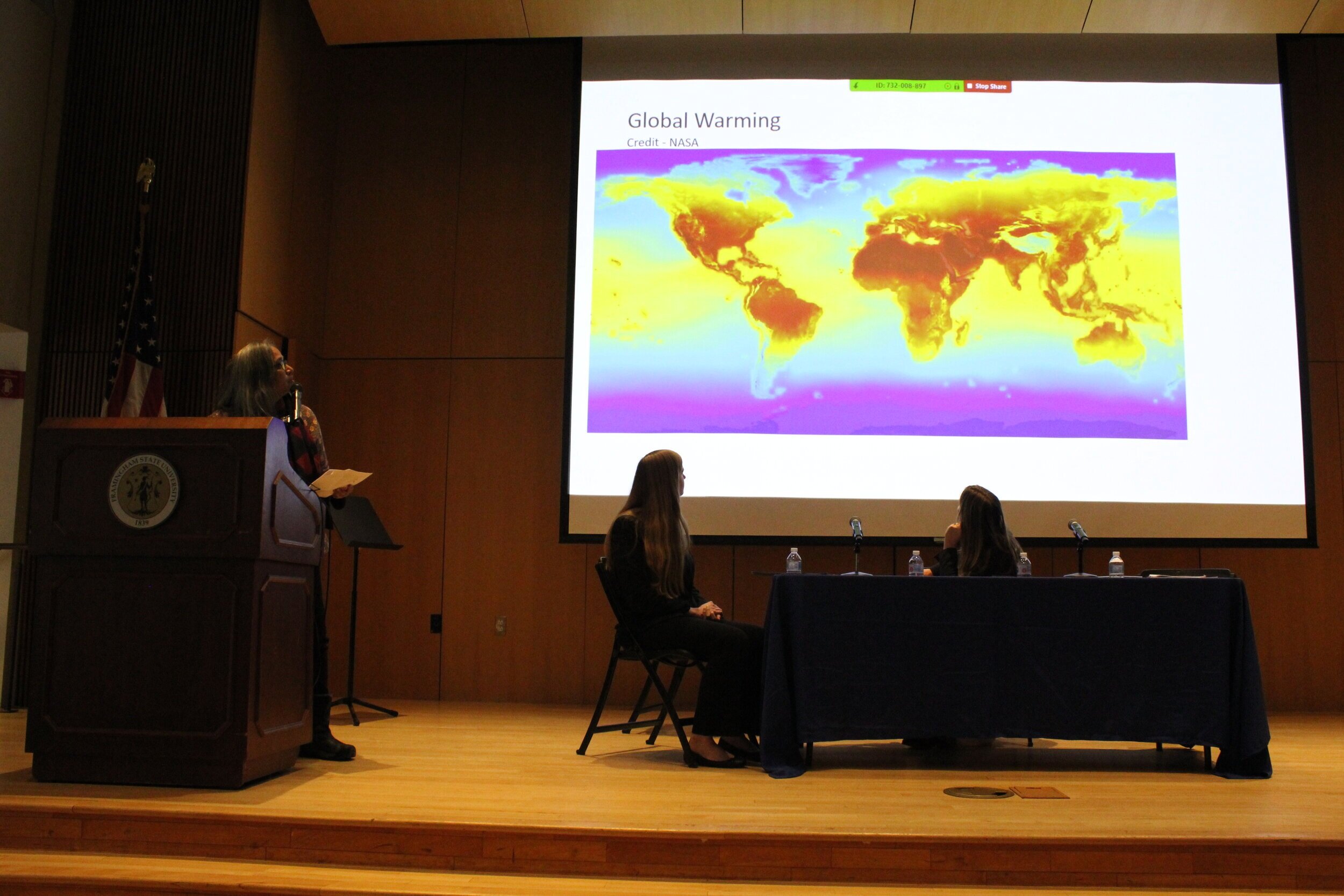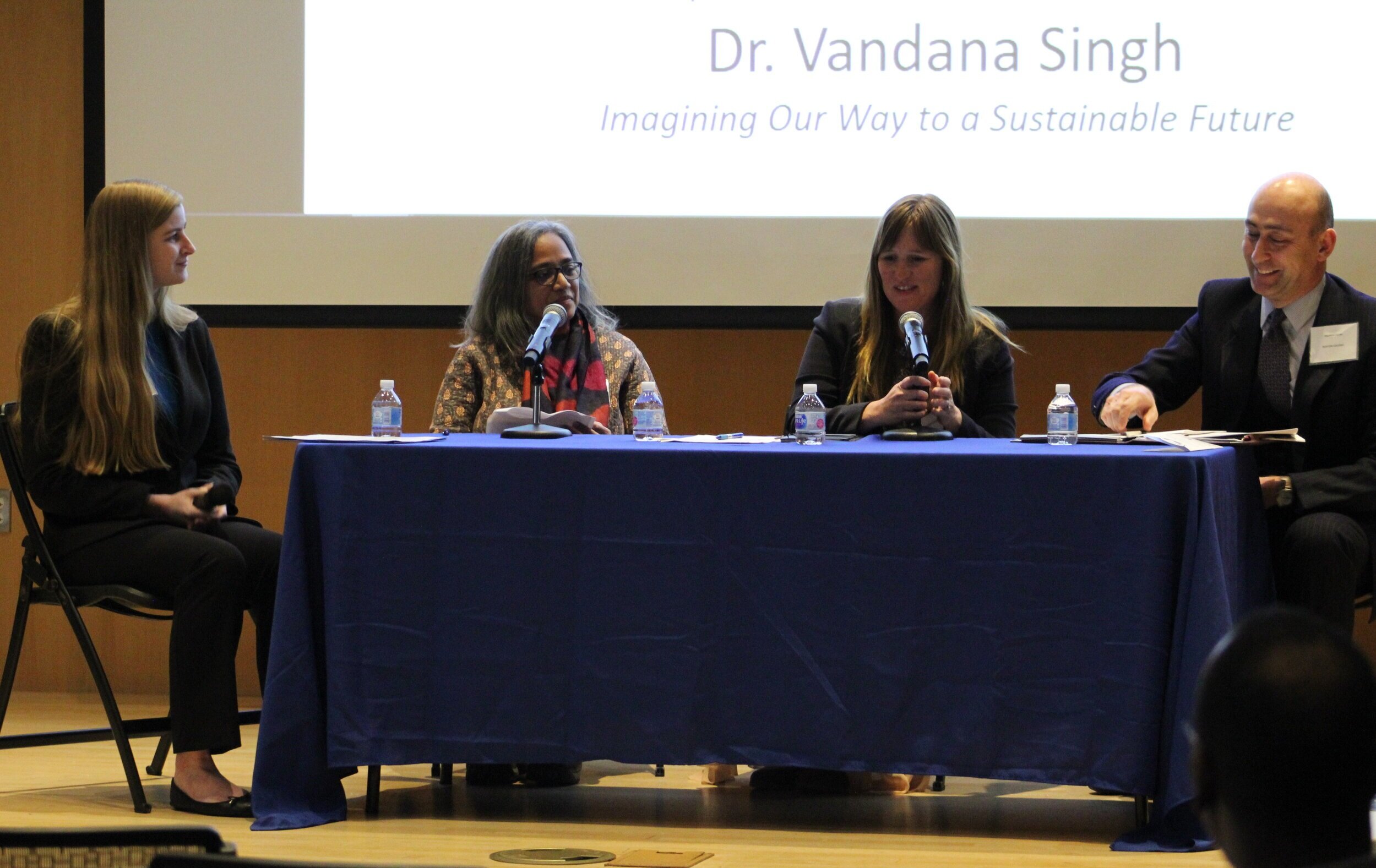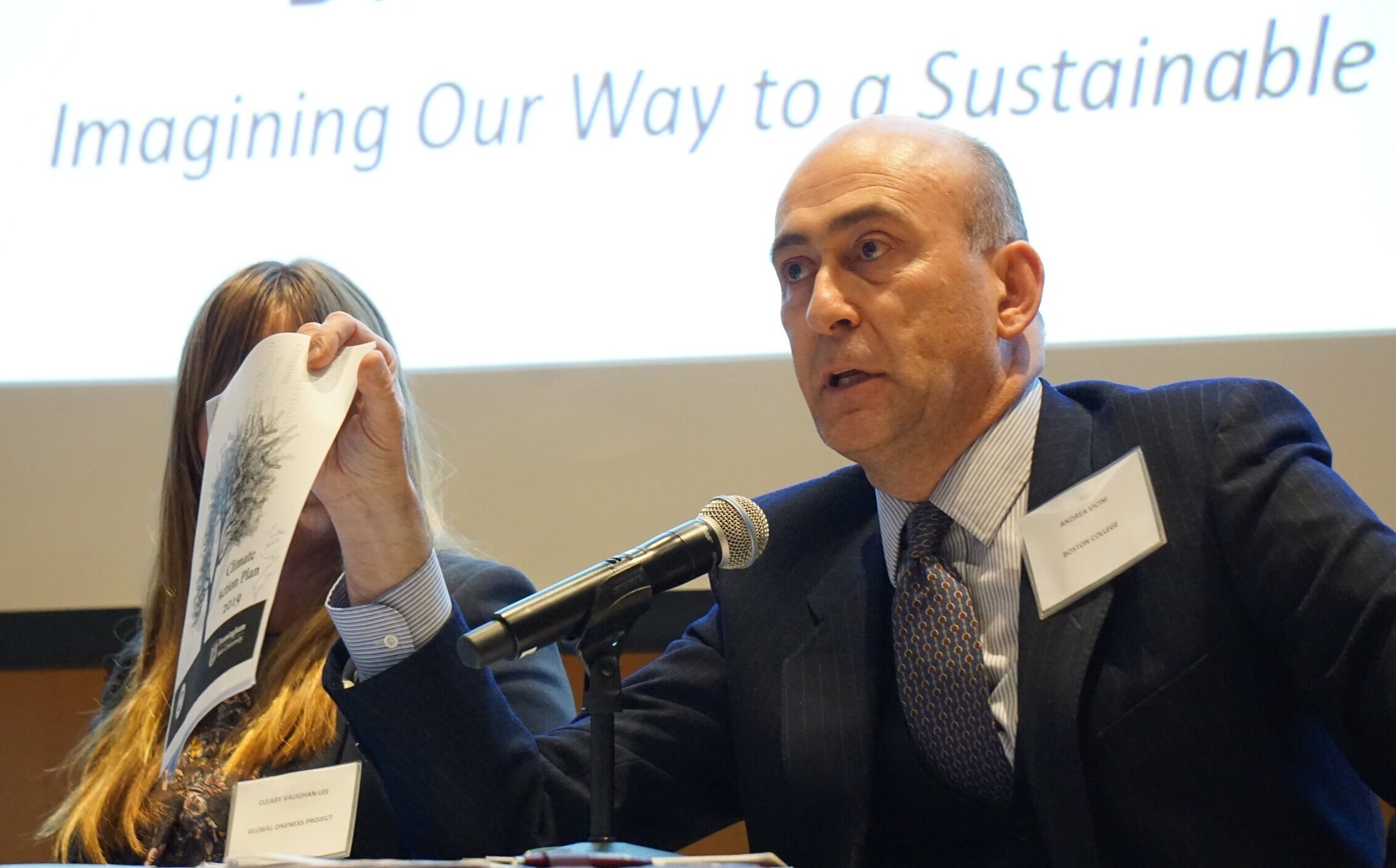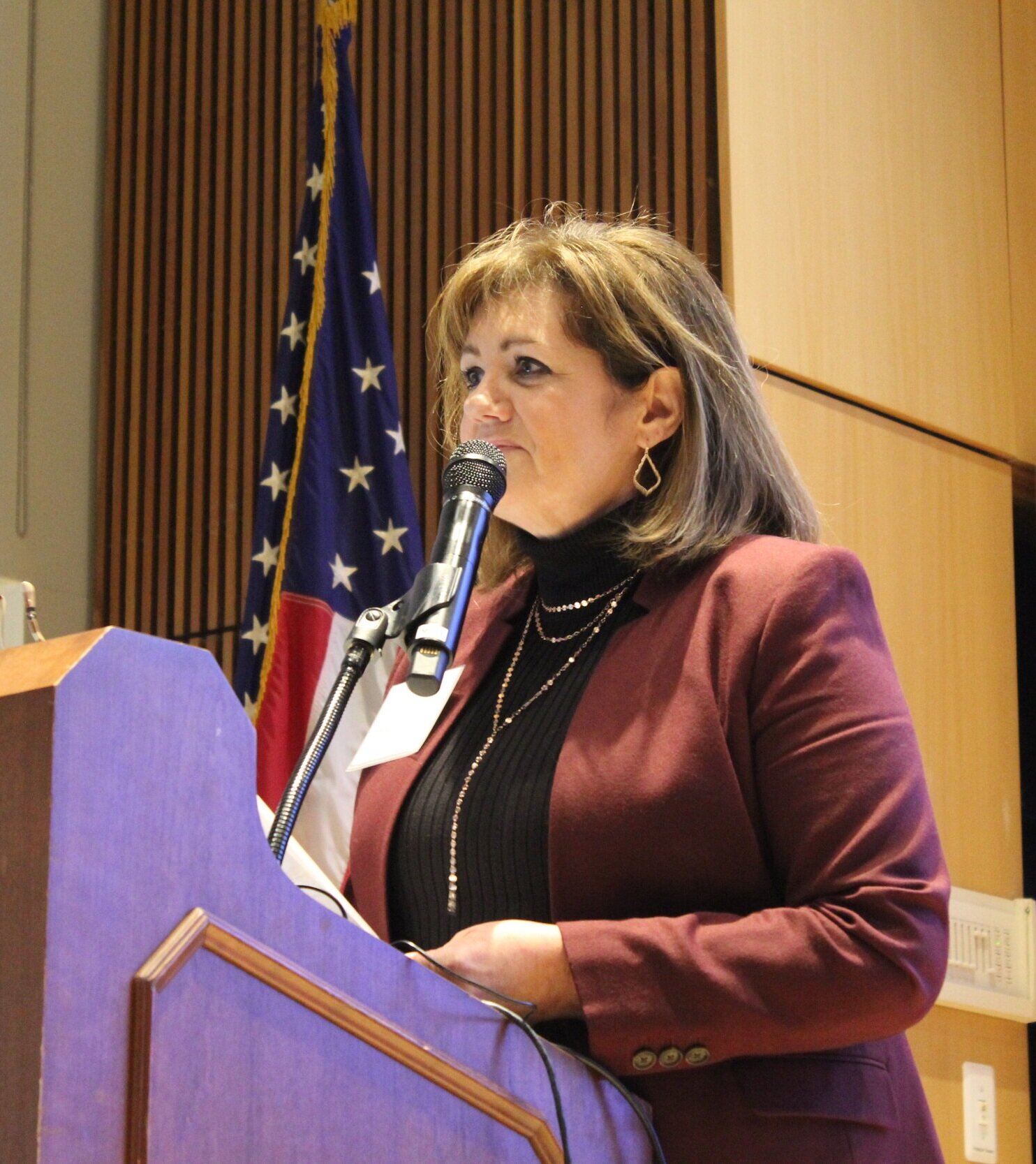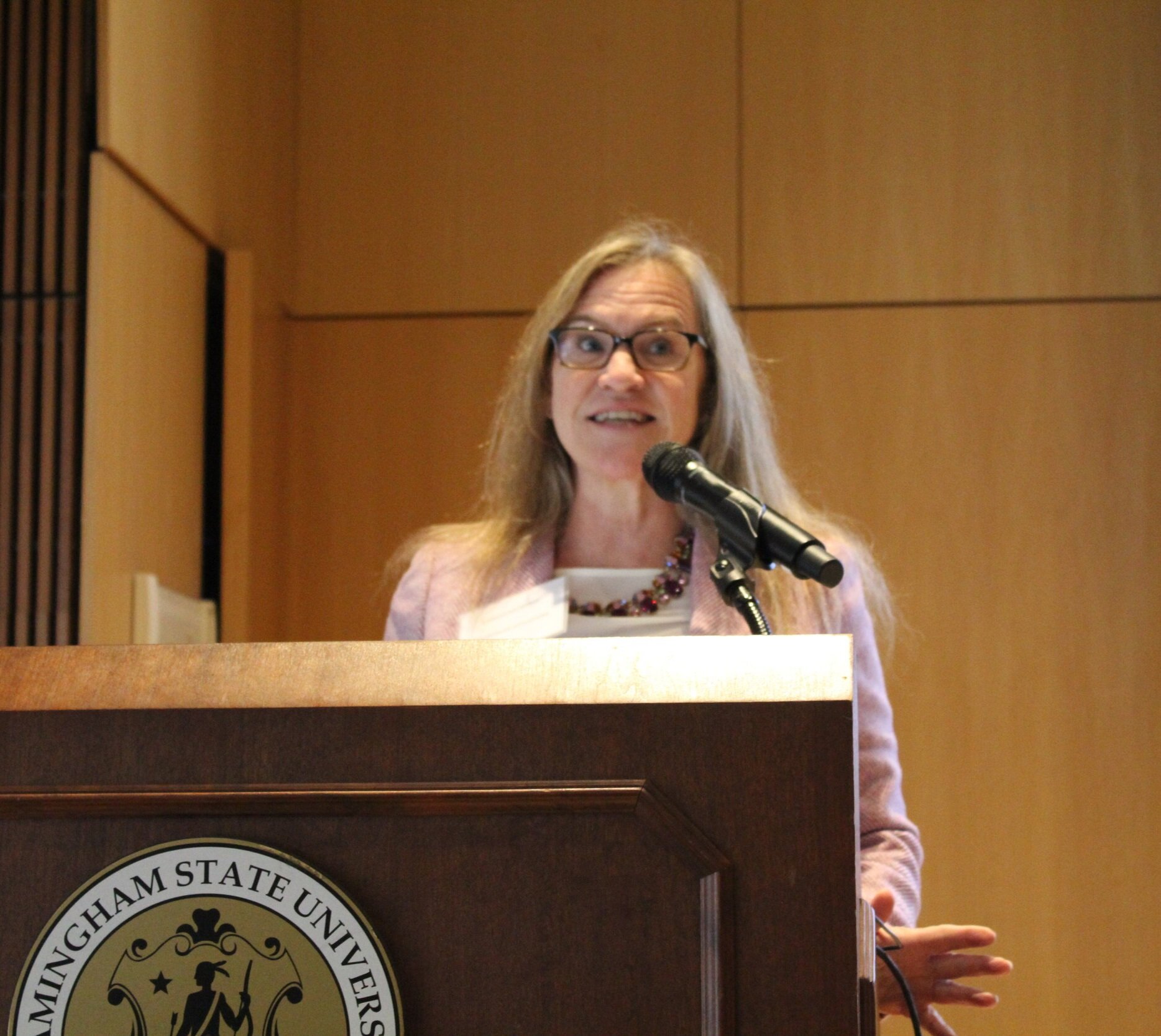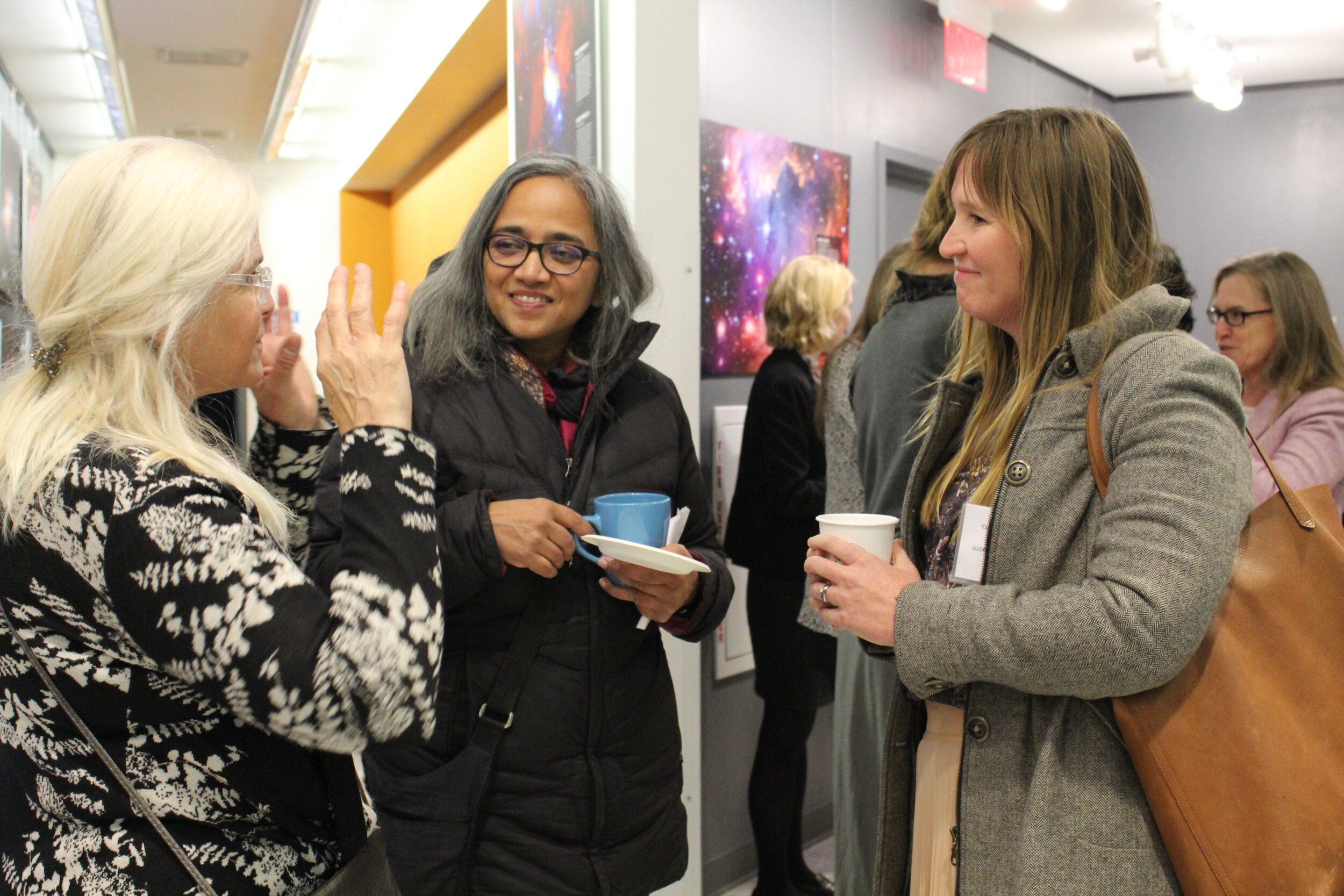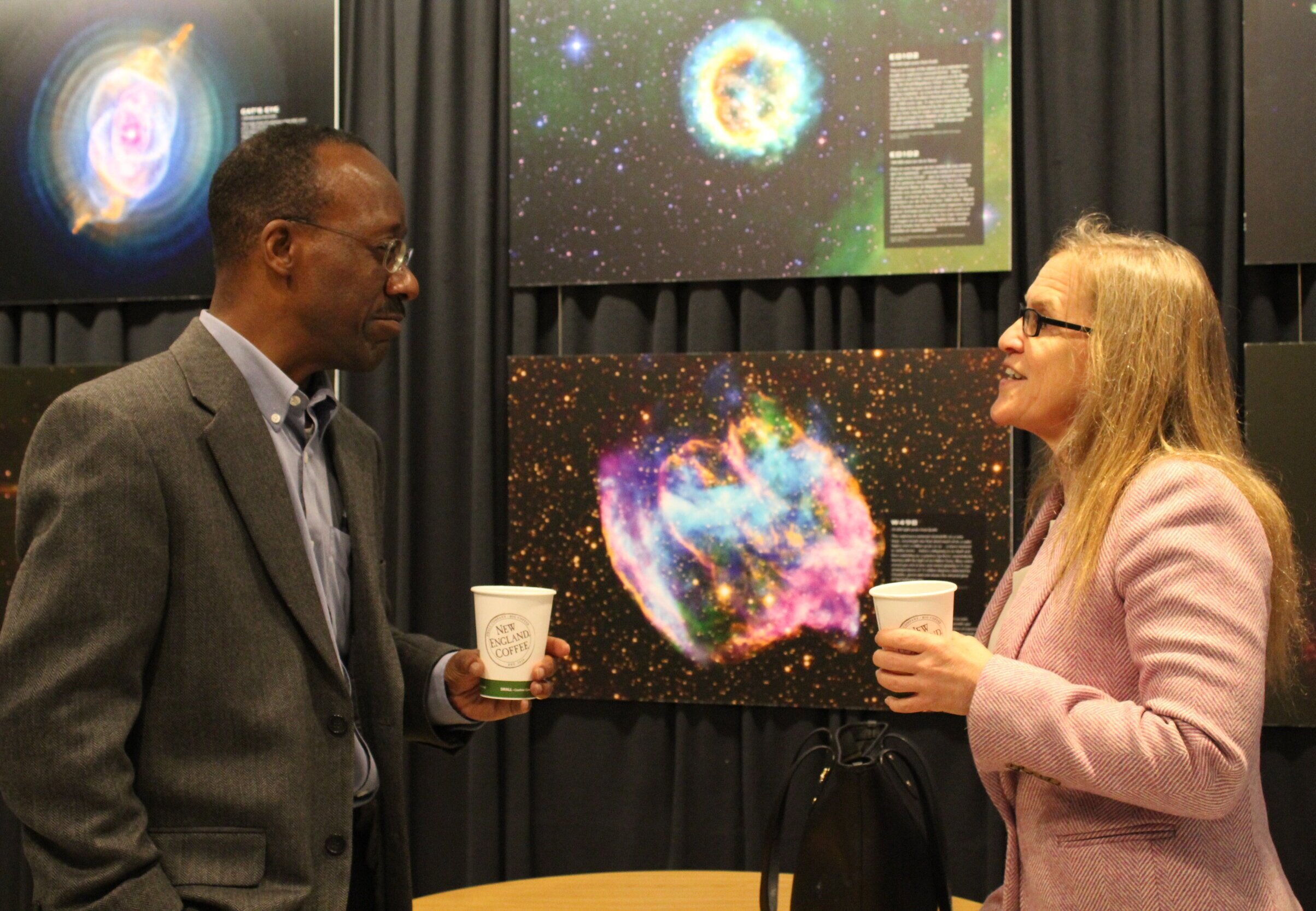Sustainable Space, Sustainable Earth: From Ideas to Action
Friday, December 6, 2019 from 8:30AM to 4:00PM
Framingham State University, McCarthy Center Forum
Whether you are concerned about Earth sustainability or you are galvanized by the prospective technological and economic advancements from space exploration, you should care about space sustainability. Consider how we can maximize the effectiveness of using space for addressing global challenges!
To watch speaker presentations that have been edited from live stream video, visit the symposium videos page.
Keynote Presentation
The Role of Space Technology to Support Sustainable Development
Dr. Danielle Wood
Massachusetts Institute of Technology Media Lab and the Space Enabled Research Group
Biography and Abstract
Video
Presentations
Impossible Journey: Apollo 11 to the Moon
Dr. Matthew Hersch
History of Science, Harvard University
Biography and Abstract
Video
"For ALL Mankind..." Seeking a Sustainable Space Politics
Dr. David Burbach
Space Policy, U.S. Naval War College
Biography and Abstract
Video
UN COPUOS and Space Sustainability
Dr. David Kendall
Space Policy, 2016-2017 Chair of the United Nations Committee on the Peaceful Uses of Outer Space
Biography and Abstract
Video
How to Protect the Earth from an Asteroid Impact, an Introduction to Planetary Defense
Dr. Alissa Haddaji
Space Law and Policy, Harvard University
Biography and Abstract
Video
Panel Discussion
The Power of Photography to Bear Witness to Our Planet
Cleary Vaughan-Lee
Global Education, Global Oneness Project
Biography and Abstract
Video
Sustainable Space, Sustainable Earth: A Bioethical Agenda
Dr. Andrea Vicini, S.J.
Bioethics, Boston College
Biography and Abstract
Video
Imagining Our Way to a Sustainable Future
Dr. Vandana Singh
Physics and Science Fiction, Framingham State University
Biography and Abstract
Video
Facilitated By:
Suzanne Wright
Framingham State University, Class of 2019
Biography
Video
Report Back
Rebecca Hawk
Framingham State University and Doctoral Candidate in Law and Public Policy at Northeastern University
Biography
Jennifer Brundage
National Outreach Manager, Smithsonian Affiliations
Biography
Opening and Closing Remarks
Dr. Irene Porro
Director, Moon Landing in Context and Christa McAuliffe Center for Integrated Science Learning
Biography
Goals and Registration
At the end of the Moon Landing in Context’s 18-month exploration of the historical, social, cultural, political, and policy contexts of the Apollo era, this one day symposium brings together a multidisciplinary group of renowned scholars to illustrate the urgency to focus on space sustainability that is the secure, sustainable, and peaceful use of space for the benefit of planet Earth and all its peoples.
For more information, please contact moonlanding.info@framingham.edu.
Biographies
Dr. Danielle Wood serves as an Assistant Professor in Media Arts & Sciences and holds a joint appointment in the Department of Aeronautics & Astronautics at the Massachusetts Institute of Technology. Within the MIT Media Lab, Dr. Wood leads the Space Enabled Research Group which seeks to advance justice in Earth's complex systems using designs enabled by space. Dr. Wood is a scholar of societal development with a background that includes satellite design, earth science applications, systems engineering, and technology policy. In her research, Dr. Wood applies these skills to design innovative systems that harness space technology to address development challenges around the world. Prior to serving as faculty at MIT, Dr. Wood held positions at NASA Headquarters, NASA Goddard Space Flight Center, Aerospace Corporation, Johns Hopkins University, and the United Nations Office of Outer Space Affairs. Dr. Wood studied at the Massachusetts Institute of Technology, where she earned a PhD in engineering systems, SM in aeronautics and astronautics, SM in technology policy, and SB in aerospace engineering.
Abstract:
Professor Danielle Wood leads the new Space Enabled Research Group at the MIT Media Lab. The Space Enabled Research Group advances justice and development by improving designs for complex systems. The mission of the Space Enabled Research Group is to advance justice in Earth's complex systems using designs enabled by space. Our message is that six types of space technology are supporting societal needs, as defined by the United Nations Sustainable Development Goals. These six technologies include satellite earth observation, satellite communication, satellite positioning, microgravity research, technology transfer, and the inspiration we derive from space research and education. While much good work has been done, barriers still remain that limit the application of space technology as a tool for sustainable development. The Space Enabled Research Group works to increase the opportunities to apply space technology in support of the UN Sustainable Development Goals. Our research applies six methods, including design thinking, art, social science, complex systems, satellite engineering and data science. We pursue our work by collaborating with development leaders who represent multilateral organizations, national and local governments, non-profits and entrepreneurial firms to identify opportunities to apply space technology in their work. We strive to enable a more just future in which every community and country can easily and affordably apply space technology. The talk will provide examples showing how each of these areas contributes to the Sustainable Development Goals of the United Nations.
Dr. Matthew Hersch, Harvard University: Dr. Hersch is an Associate Professor of the History of Science at Harvard University. He is a historian of technology whose research examines Cold War era aerospace, computer, and military technologies and their relationship to labor and popular culture.
Abstract:
Most astonishing about Apollo 11’s voyage to the Moon fifty years ago was humanity’s confidence, in the centuries that preceded it, that the organizational and technical obstacles to such a trip could be overcome, and that the dangers people would face on the way were worth the risk. Today, landing on the Moon may seem almost impossible, but that is only because Apollo 11’s success was only one small step in a nearly four-hundred-year journey that began with the first telescope and ended with a reconfiguration of popular notions of the possible.
Dr. David Burbach, U.S. Naval War College: Dr. Burbach is an Associate Professor of National Security Affairs at the U.S. Naval War College. He teaches on African regional security, U.S. grand strategy, and defense planning and is a political scientist specializing in international relations and the politics of U.S. foreign policy.
Abstract:
While space exploration is often described in terms of universal human progress, the Apollo missions to the Moon would never happened but for US - Soviet competition. Long after 1969, military applications and "national leadership" continued to be key rationales. Public support for Apollo was never universal; many communities saw little of relevance to their concerns in that display of technical might. Public opinion polls find that today the American public is more willing to fund space exploration than they have been in decades. The most persuasive arguments for space exploration are its benefits for humanity: understanding climate change and other environmental problems, or the scientific study of other worlds and better understanding life on Earth. A sustainable politics of space is directly related to sustainable development of space. Three trends put the sustainable politics of space exploration at risk. First, there is no public demand for a rushed re-run of Apollo, and doing so for political purposes risks space becoming just another partisan issue. Militarization of space, not only via space weaponry but framing space exploration as competition to "dominate" other worlds is unlikely to have the appeal it did during the post-Sputnik panic. Finally, despite the achievements of "New Space" entrepreneurs like Elon Musk and Jeff Bezos, their techno-utopian visions for space colonization imply a future of inequality, abandonment rather than advancement of humanity, and an implicit rejection of politics itself -- reinforcing other trends to tune out civic life and abandon hope for cooperative solutions to our shared problems.
Dr. David Kendall, 2016-2017 Chair of the United Nations Committee on the Peaceful Uses of Outer Space: During his career, Dr. Kendall has acted in various capacities on a number of national and international bodies, including the International Space University, the International Astronautical Federation, the Committee on Space Research (COSPAR), UN COPUOS, the European Space Agency, the Inter-Agency Space Debris Coordination Committee, the Group on Earth Observations, and the Natural Sciences and Engineering Research Council of Canada.
Abstract:
The United Nations Committee on the Peaceful Uses of Outer Space, COPUOS, was set up by the UN General Assembly in 1959 to govern the exploration and use of space for the benefit of all humanity: for peace, security and development. The Committee was tasked with reviewing international cooperation in peaceful uses of outer space, studying space-related activities that could be undertaken by the United Nations, encouraging space research programmes, and studying legal problems arising from the exploration of outer space. In 2010 a Working Group was created to consider practices, technical standards and policies relevant to sustaining the space environment and space activities through all phases of mission life cycle through the development of voluntary best practice guidelines to enhance the long-term sustainability of outer space activities for all space actors and all who benefit from space activities. This Working Group concluded its work last year with the provision of a report containing 21 comprehensive, wide-ranging guidelines that has been endorsed by the Committee and the UN General Assembly.
Dr. Alissa Haddaji, Harvard University: Dr. Haddaji is a lecturer in Space Law, Policy, and Sociology at Harvard University and leads the United Nations-mandated Planetary Defense International Legal Working Group.
Abstract:
The international Planetary Defense community has been steadily growing over the past 20 years while increasing its capabilities to detect Near Earth Objects (NEOs) such as asteroids and comets. It has also coordinated efforts worldwide in order to best mitigate a possible impact threat to Earth. Collaborative efforts have been developed at the United Nations as well as through UN-mandated expert groups. They tackle today a large array of topics ranging from ways of detecting these objects to technical capabilities to push them away, to the legal questions raised by these new possible missions. We will explore the events that led to the emergence of this one-of-a-kind field of study, review their ways of practice and discuss their latest research on the legal implications of Planetary Defense missions.
Cleary Vaughan-Lee, Global Oneness Project: Vaughan-Lee is the Executive Director of the Global Oneness Project. She works on integrating a humanistic lens with universal values into educational content, asking local to global questions about culture and the environment. She is a regular contributor to Education Week, PBS, Share My Lesson, and TED Ed.
Abstract:
How can the Earthrise photograph provide a context for what it means to be a global citizen? Inspired by the Global Oneness Project Emmy-nominated film Earthrise, a photography project will be shared along with student work from around the globe. This project gets to the heart of our human connection to the Earth, our relationship to the living world, and how we can become advocates for protecting and documenting local ecologies.
Dr. Andrea Vicini, S.J., Boston College: Dr. Vicini is the Michael P. Walsh Professor of Bioethics at Boston College. Dr. Vicini is currently writing a book on the ethical issues concerning new biotechnologies that will examine: global health, regenerative medicine, neuroscience, synthetic biology, and nanotechnology.
Abstract:
Sustainability defines both the ethical goal that humanity should pursue–on Earth and in the universe–and how this goal should be achieved–in sustainable ways. An integral and inclusive understanding of justice fosters sustainable and just actions and practices. In the case of individuals, groups, and the whole Earth, the principle of the common good helps to implement social and planetary justice because it aims at individual and collective flourishing, for human beings and the Earth.
Dr. Vandana Singh, Framingham State University: Dr. Singh is a Professor of Physics at Framingham State University and a science fiction writer. Whether writing science fiction, teaching, or developing pedagogies to transform STEM education, she is motivated by the creative space at the intersection of multiple disciplines and modes of communication.
Abstract:
To imagine a sustainable future in our current dark age is both necessary and revolutionary. Science has always relied on the imagination, married to the rigor of scientific methodology, to explain phenomena that challenge our current conceptions of reality. However the increasingly dire climate crisis calls for us to radically re-think everything. The transdisciplinary nexus where science meets the social sciences, arts and humanities is the crucible where we must fire our imaginations. This nexus is the natural habitat of science fiction, which can potentially free the imagination from the constraints of our default frameworks. To then leap from imagination to meaningful action is the urgent challenge of the times.
Rebecca Hawk, Framingham State University: Hawk is the Director of Community Education and English Language Programs at Framingham State University. She has worked as an environmental policy analyst representing the interests of Native Americans on air and water quality issues. She is a doctoral candidate in law and public policy at Northeastern University. Her thesis is entitled As it is on Earth, so it has become in space: an evidentiary approach to understanding the philosophical basis of the problem of orbital debris.
Jennifer Brundage, National Outreach Manager, Smithsonian Affiliations: Brundage has been with the Smithsonian Institution for over 20 years in a variety of roles, serving first as an educator at the Cooper Hewitt, Smithsonian Design Museum. Since 2006, Brundage has been a National Outreach Manager in Smithsonian Affiliations, managing over 50 of the Institution’s strategic partnerships with museums and universities.
Dr. Irene Porro, Director, Moon Landing in Context: Dr. Irene Porro is the Director of the Moon Landing in Context project that aims to reflect on the Moon Landing and critically analyze its implications on the world social climate and on national and international policies, both from a historical perspective and for contemporary and future developments. Dr. Porro received her Ph.D. in Space Science and Technology from the University of Padova, Italy and was a researcher at the Harvard-Smithsonian Center for Astrophysics, and the Max Planck Institut für Astronomie. During her 14 years tenure at the Massachusetts Institute of Technology she was the Director of the Education and Outreach Group of the MIT Kavli Institute for Astrophysics and Space Research. Dr. Porro is an alumna of the International Space University, an international education program that specializes in providing graduate-level training to the future leaders of the emerging global space community. Since 2014, she has been serving as the Director of the Christa McAuliffe Center for Integrated Science Learning at Framingham State University where she promotes opportunities for integrated learning through the sharing of resources, building of partnerships, and advancement of educational practices.
Suzanne Wright, Framingham State University: Wright recently graduated with a Bachelor of Arts in History from Framingham State University and assumed the role of Informal Science Education Coordinator at the Christa Corrigan McAuliffe Center for Integrated Science Learning. She has also served as the intern for the Moon Landing in Context Project since the inception of the series.
